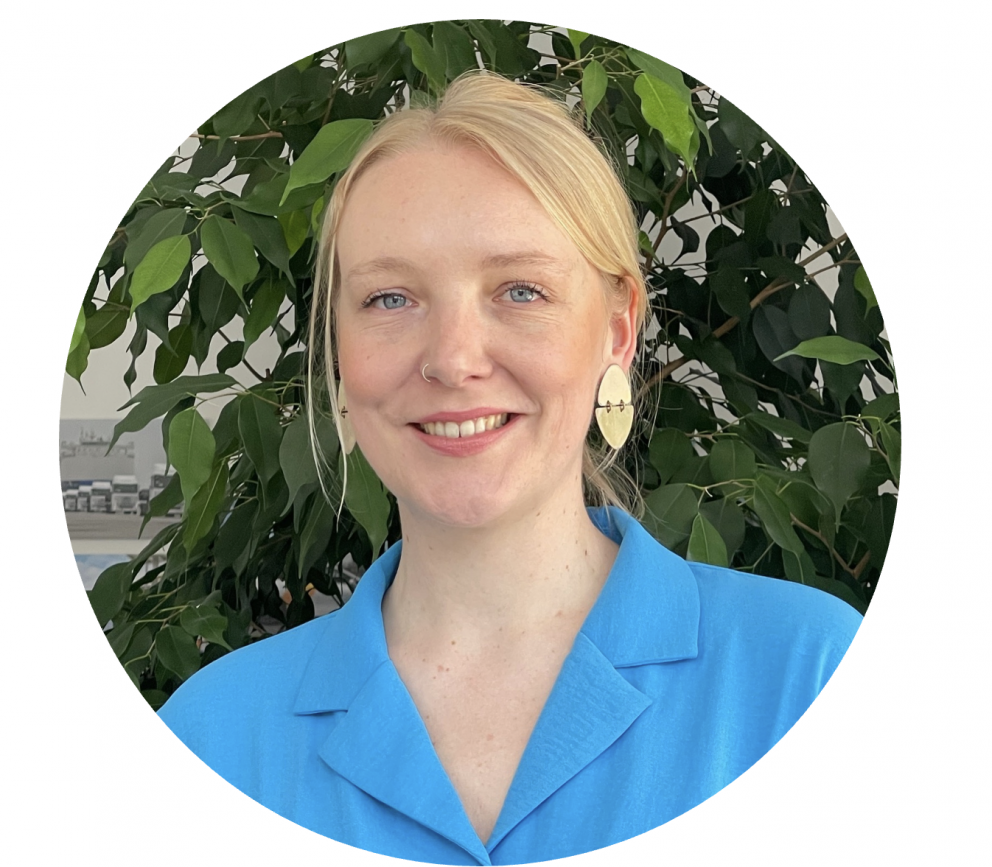Media contact
Your contact person
Press Releases
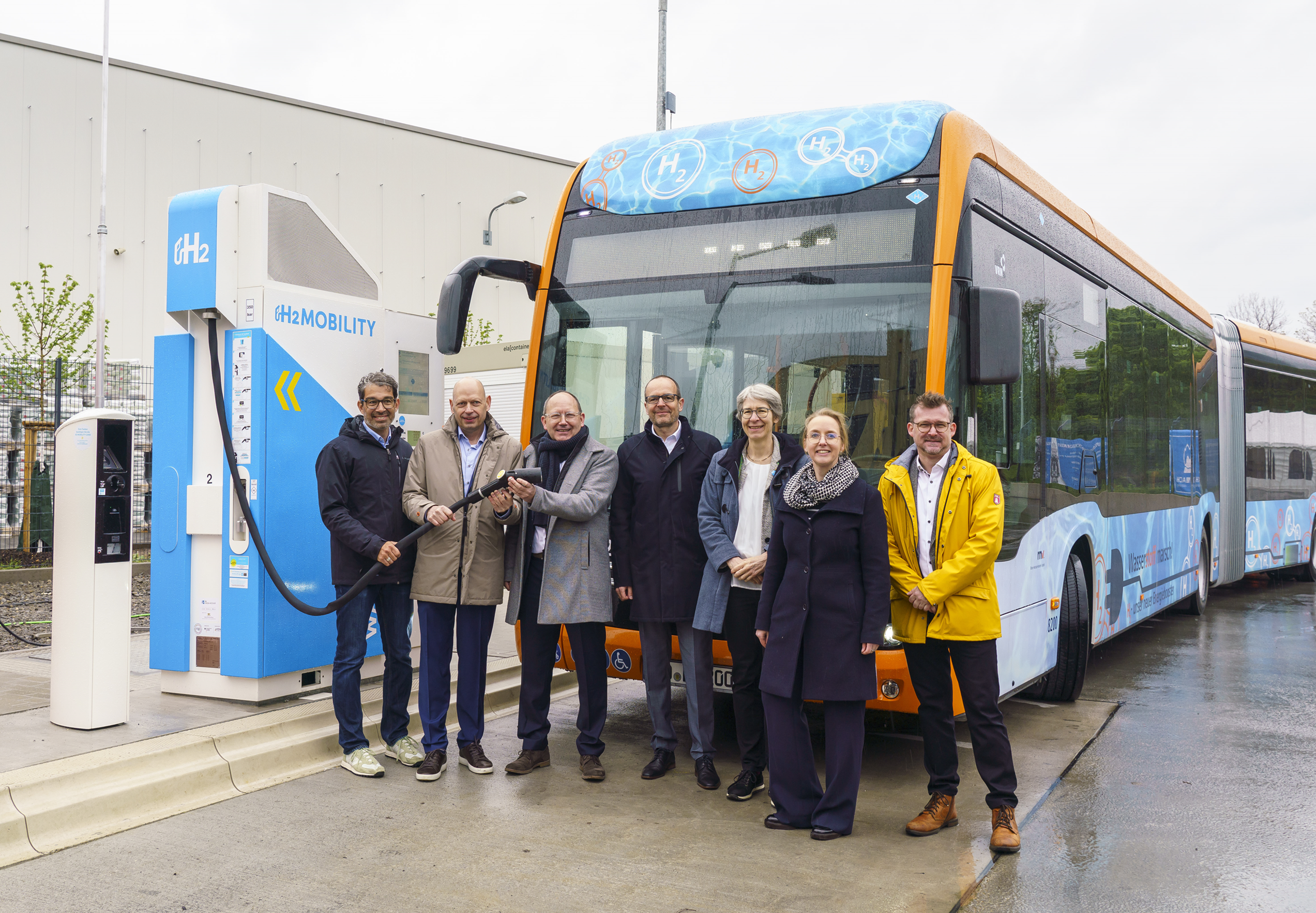 Heidelberg, 19 April 2024 | The public hydrogen refuelling station from H2 MOBILITY was officially put into operation today as part of the depot presentation for buses with alternative drive systems by Rhein-Neckar-Verkehr GmbH (rnv).
The new public hydrogen refuelling station offers a capacity of over 1,000 kg of hydrogen per day, three dispensers and—in addition to the refueling capacity for rnv’s 27 fuel cell range extender articulated buses—further refuelling options for H2 vehicles from the region. The refuelling station is operated by H2 MOBILITY and was also developed and built by the company. As part of the gradual commissioning, cars (700 bar) and trucks (350 bar) will also be able to refuel publicly at Wieblinger Weg 92, probably from May 2024. The hydrogen refuelling station will then also be used by Heidelberg’s waste collection service, which has had an emission-free vehicle with a fuel cell drive in its fleet since March 2023. The hydrogen refuelling station is conveniently located close to the A5 and the city.
“The new rnv depot shows: The entry into the hydrogen economy has been achieved in the metropolitan region! that the metropolitan region has made a start in the hydrogen economy. Thanks to the 16.7 million euros funding for the H2Rhein-Neckar project from the from the Baden-Württemberg Ministry of Environment, hydrogen can be experienced locally by citizens in climate-friendly local public transport. In conjunction with the federally funded H2Rivers project, a hydrogen ecosystem with lighthouse character is being created here in the region. The hydrogen that can be refuelled at the Heidelberg depot comes from a short distance from Friesenheimer Insel in Mannheim,” says Dr. Andre Baumann, State Secretary at the Baden-Württemberg Ministry of Environment, Climate Protection and the Energy Sector. ”A successful ramp-up of the hydrogen economy is of central importance for Baden-Württemberg—both to achieve the climate targets and to secure the industrial location. Pioneering projects such as those in the Rhine-Neckar metropolitan region are making decisive progress in this regard,” explains the State Secretary.
The accompanying research in the H2Rhine-Neckar project also enables other regions to benefit from the experience gained. Among other things, the new depot will be used to analyze the ideal processes for buses with alternative drive systems in order to support bus companies in the transformation.
“Climate-friendly public transport is essential for sustainable mobility. Bus transport in particular, where the Clean Vehicle Directive sets clear targets for electrification, offers a lever for this. The climate targets can only be achieved if we reduce emissions. rnv is turning emission-free mobility into reality on site. The new depot creates the necessary infrastructural framework conditions for the use of alternative drive systems,” adds Elke Zimmer, State Secretary at the Baden-Württemberg Ministry of Transport. “In order for the mobility transition to succeed throughout the state, it is important to pass on the experience gained from pioneering projects like this one. In addition to the accompanying research, the zero-emission bus network, which is coordinated by the state agency e-mobil BW and offers public transport operators and local authorities a forum for exchanging experiences, is also providing support,” Ms. Zimmer continued.
27 H2-eCitaro articulated buses, which Rhein-Neckar-Verkehr GmbH (rnv) is procuring in Heidelberg as part of the H2Rhein-Neckar funding project, will be parked at the depot, refuelled with hydrogen and charged with electricity. The project volume for the new depot is €24.5 million, including planning costs. The public hydrogen refuelling station and parts of the infrastructure are being funded by the Ministry for Environment, Climate Protection and the Energy Sector via the H2Rhein-Neckar hydrogen demonstration project.
Public hydrogen refuelling station for public transport, commercial vehicles and cars
Frank Fronzke, Managing Director and COO of H2 MOBILITY, explains: “In Heidelberg, one of the most important refuelling station projects of the year is officially starting operations today. The hydrogen refuelling station is the first in a series of new H2 MOBILITY openings and is the first of our four new stations in the Rhine-Neckar region.” Further public hydrogen refuelling stations that H2 MOBILITY will build and operate in the region will be built in Mannheim by summer 2024, in Frankenthal by the end of 2024 and in Ludwigshafen by the beginning of 2025. “The size and capacity of the new stations represent a new generation of H2 refuelling stations. Using high-performance technology, several 350 and 700 bar vehicle types can refuel at the same location—buses, trucks, light commercial vehicles and cars. The location in Heidelberg and the upcoming new openings demonstrate the importance of partnerships with local players who are determined to drive forward the mobility transition. The collaboration is currently creating a high-performance, comprehensive refuelling station network for public transport, transport logistics and private vehicles in this region. We look forward to contributing to the establishment of a high level of supply security and ensuring high availability with our experienced team.”
Mobility with hydrogen becomes tangible
The H2-eCitaros use both the battery and the fuel cell for propulsion, which enables a greater range and thus emission-free bus transport even on longer and hilly sections, such as those frequently found in Heidelberg. The new vehicles are expected to be on the road in Heidelberg from June 2024 so that citizens can experience mobility with hydrogen for themselves. Prior to this, the refuelling system, vehicles and processes at the new depot will be tested extensively over the next few weeks and staff will be trained.
“The hydrogen economy offers Heidelberg many new opportunities and possibilities for an attractive mobility transition: With the hydrogen buses, we can make Heidelberg’s bus network more modern and environmentally friendly. This will particularly benefit us in Heidelberg’s topographically challenging terrain,” says Raoul Schmidt-Lamontain, Mayor for Climate Protection, Environment and Mobility. “The city of Heidelberg and rnv are also using the buses to significantly develop the city’s existing hydrogen fleet, which already includes six hydrogen vehicles. Private individuals and companies can also benefit from these opportunities at the depot. The infrastructure offers them the opportunity to switch to environmentally friendly hydrogen technology with their vehicles. In this way, we are also investing in the future of the city and the region,” explains Schmidt-Lamontain.
“The rnv hydrogen depot in Heidelberg, together with the procurement of hydrogen buses for Heidelberg, Ludwigshafen and Mannheim, is an important milestone on the way to climate-neutral local public transport. The H2Rhine-Neckar and H2Rivers projects and the new depot with a public hydrogen filling station also contribute to the development of a hydrogen-based value chain throughout the region,” says Christian Specht, Mayor of Mannheim and Chairman of the Supervisory Board of rnv, emphasizing: “This shows that rnv, the cities and the region are pulling together for decarbonization and the energy transition.”
“Although it is always more environmentally friendly to use the bus or train instead of your own car, we don’t want to rest on our ecological laurels. Our goal is therefore to convert our entire vehicle fleet to locally emission-free drives by 2032. We are open to all technologies and are focusing on both conventional e-buses and e-buses with fuel cells. Depending on what makes more sense under the local conditions,” says Christian Volz, Commercial Director of rnv. “In Heidelberg, we have comparatively long bus routes, some of which also have a few meters of altitude to overcome. In addition, we use a lot of articulated buses in Heidelberg for capacity reasons, and it makes sense to use a fuel cell here simply because of their weight. Accordingly, the lion’s share of our new H2 eCitaros will be used here,” Volz continues. “For this reason, I am delighted that we can now open our new depot after a good year and a half of construction. Especially because the construction was not easy due to the combination of two different infrastructures and the difficult market situation.
Pilot project for hydrogen mobility in the Rhine-Neckar region
A hydrogen ecosystem is being created in the Rhine-Neckar metropolitan region with one of the largest demonstration projects for H2 mobility in south-west Germany: the H2Rhein-Neckar and H2Rivers projects are testing the use of new hydrogen technologies and providing new insights for the development of a regional value chain.
Isabell Knüttgen, Head of Hydrogen Activities at the state agency e-mobil BW, explains: “Demonstration projects such as H2Rhein-Neckar and H2Rivers are crucial for the development of a hydrogen economy. They gather important experience for the further development of technologies and form a basic framework so that a hydrogen ecosystem can function and grow—this can only succeed through cooperation along the entire value chain. We see mobility as a pacemaker for the ramp-up of the hydrogen economy; the basic prerequisite for this is a parallel development of the infrastructure and delivery of vehicles.
Public transport with hydrogen mobility can also be experienced in the region beyond Heidelberg: rnv is procuring 13 additional H2 eCitaros for use in Mannheim and eight for Ludwigshafen. In addition to the buses, the use of hydrogen and fuel cell technology is also being tested in other vehicles, including fuel cell waste collection vehicles.
About H2Rhine-Neckar and H2Rivers
How can hydrogen be produced and distributed locally and used for climate-friendly mobility? This is demonstrated by the H2Rivers and H2Rhine-Neckar funding projects, with a project volume of almost €100 million. Hydrogen is produced and distributed by the H2 Hub in Mannheim and hy.waiblingen and then used in fuel cell waste collection vehicles and fuel cell cars, among other things. The conversion of public transport to fuel cell range extender buses also provides important findings for local authorities and bus operators, scientifically evaluated in accompanying research. The H2Rhein-Neckar project is being funded with €16.7 million by the Baden-Württemberg Ministry of Environment, Climate Protection and the Energy Sector and coordinated by the state agency e-mobil BW. H2Rivers is funded with €20 million by the Federal Ministry for Digital and Transport Affairs and coordinated by Metropolregion RheinNeckar GmbH. Further information can be found at www.h2rivers.de
About H2 MOBILITY
H2 MOBILITY Deutschland is a pioneer in the development of a public hydrogen refuelling station network and Europe’s largest operator of public hydrogen stations. Its business areas include the development, financing, planning, construction, marketing and operation of the stations. H2 MOBILITY Deutschland was founded in 2015 as a project company with the aim of promoting hydrogen as an emission-free fuel in road transport. In 2022, the project company became a long-term, commercially oriented company with the aim of contributing to the energy transition in transport through a high-performance hydrogen refuelling station network. To this end, H2 MOBILITY Deutschland will rely on renewable hydrogen throughout its entire station network by 2028.
Alternative drives at rnv
Further information on e-buses, hydrogen fuel cells and alternative drives at rnv can be found at www.rnv-online.de/alternative-antriebe.
Image: Copyright: rnvGmbH/Haubner, from left to right:
Heidelberg, 19 April 2024 | The public hydrogen refuelling station from H2 MOBILITY was officially put into operation today as part of the depot presentation for buses with alternative drive systems by Rhein-Neckar-Verkehr GmbH (rnv).
The new public hydrogen refuelling station offers a capacity of over 1,000 kg of hydrogen per day, three dispensers and—in addition to the refueling capacity for rnv’s 27 fuel cell range extender articulated buses—further refuelling options for H2 vehicles from the region. The refuelling station is operated by H2 MOBILITY and was also developed and built by the company. As part of the gradual commissioning, cars (700 bar) and trucks (350 bar) will also be able to refuel publicly at Wieblinger Weg 92, probably from May 2024. The hydrogen refuelling station will then also be used by Heidelberg’s waste collection service, which has had an emission-free vehicle with a fuel cell drive in its fleet since March 2023. The hydrogen refuelling station is conveniently located close to the A5 and the city.
“The new rnv depot shows: The entry into the hydrogen economy has been achieved in the metropolitan region! that the metropolitan region has made a start in the hydrogen economy. Thanks to the 16.7 million euros funding for the H2Rhein-Neckar project from the from the Baden-Württemberg Ministry of Environment, hydrogen can be experienced locally by citizens in climate-friendly local public transport. In conjunction with the federally funded H2Rivers project, a hydrogen ecosystem with lighthouse character is being created here in the region. The hydrogen that can be refuelled at the Heidelberg depot comes from a short distance from Friesenheimer Insel in Mannheim,” says Dr. Andre Baumann, State Secretary at the Baden-Württemberg Ministry of Environment, Climate Protection and the Energy Sector. ”A successful ramp-up of the hydrogen economy is of central importance for Baden-Württemberg—both to achieve the climate targets and to secure the industrial location. Pioneering projects such as those in the Rhine-Neckar metropolitan region are making decisive progress in this regard,” explains the State Secretary.
The accompanying research in the H2Rhine-Neckar project also enables other regions to benefit from the experience gained. Among other things, the new depot will be used to analyze the ideal processes for buses with alternative drive systems in order to support bus companies in the transformation.
“Climate-friendly public transport is essential for sustainable mobility. Bus transport in particular, where the Clean Vehicle Directive sets clear targets for electrification, offers a lever for this. The climate targets can only be achieved if we reduce emissions. rnv is turning emission-free mobility into reality on site. The new depot creates the necessary infrastructural framework conditions for the use of alternative drive systems,” adds Elke Zimmer, State Secretary at the Baden-Württemberg Ministry of Transport. “In order for the mobility transition to succeed throughout the state, it is important to pass on the experience gained from pioneering projects like this one. In addition to the accompanying research, the zero-emission bus network, which is coordinated by the state agency e-mobil BW and offers public transport operators and local authorities a forum for exchanging experiences, is also providing support,” Ms. Zimmer continued.
27 H2-eCitaro articulated buses, which Rhein-Neckar-Verkehr GmbH (rnv) is procuring in Heidelberg as part of the H2Rhein-Neckar funding project, will be parked at the depot, refuelled with hydrogen and charged with electricity. The project volume for the new depot is €24.5 million, including planning costs. The public hydrogen refuelling station and parts of the infrastructure are being funded by the Ministry for Environment, Climate Protection and the Energy Sector via the H2Rhein-Neckar hydrogen demonstration project.
Public hydrogen refuelling station for public transport, commercial vehicles and cars
Frank Fronzke, Managing Director and COO of H2 MOBILITY, explains: “In Heidelberg, one of the most important refuelling station projects of the year is officially starting operations today. The hydrogen refuelling station is the first in a series of new H2 MOBILITY openings and is the first of our four new stations in the Rhine-Neckar region.” Further public hydrogen refuelling stations that H2 MOBILITY will build and operate in the region will be built in Mannheim by summer 2024, in Frankenthal by the end of 2024 and in Ludwigshafen by the beginning of 2025. “The size and capacity of the new stations represent a new generation of H2 refuelling stations. Using high-performance technology, several 350 and 700 bar vehicle types can refuel at the same location—buses, trucks, light commercial vehicles and cars. The location in Heidelberg and the upcoming new openings demonstrate the importance of partnerships with local players who are determined to drive forward the mobility transition. The collaboration is currently creating a high-performance, comprehensive refuelling station network for public transport, transport logistics and private vehicles in this region. We look forward to contributing to the establishment of a high level of supply security and ensuring high availability with our experienced team.”
Mobility with hydrogen becomes tangible
The H2-eCitaros use both the battery and the fuel cell for propulsion, which enables a greater range and thus emission-free bus transport even on longer and hilly sections, such as those frequently found in Heidelberg. The new vehicles are expected to be on the road in Heidelberg from June 2024 so that citizens can experience mobility with hydrogen for themselves. Prior to this, the refuelling system, vehicles and processes at the new depot will be tested extensively over the next few weeks and staff will be trained.
“The hydrogen economy offers Heidelberg many new opportunities and possibilities for an attractive mobility transition: With the hydrogen buses, we can make Heidelberg’s bus network more modern and environmentally friendly. This will particularly benefit us in Heidelberg’s topographically challenging terrain,” says Raoul Schmidt-Lamontain, Mayor for Climate Protection, Environment and Mobility. “The city of Heidelberg and rnv are also using the buses to significantly develop the city’s existing hydrogen fleet, which already includes six hydrogen vehicles. Private individuals and companies can also benefit from these opportunities at the depot. The infrastructure offers them the opportunity to switch to environmentally friendly hydrogen technology with their vehicles. In this way, we are also investing in the future of the city and the region,” explains Schmidt-Lamontain.
“The rnv hydrogen depot in Heidelberg, together with the procurement of hydrogen buses for Heidelberg, Ludwigshafen and Mannheim, is an important milestone on the way to climate-neutral local public transport. The H2Rhine-Neckar and H2Rivers projects and the new depot with a public hydrogen filling station also contribute to the development of a hydrogen-based value chain throughout the region,” says Christian Specht, Mayor of Mannheim and Chairman of the Supervisory Board of rnv, emphasizing: “This shows that rnv, the cities and the region are pulling together for decarbonization and the energy transition.”
“Although it is always more environmentally friendly to use the bus or train instead of your own car, we don’t want to rest on our ecological laurels. Our goal is therefore to convert our entire vehicle fleet to locally emission-free drives by 2032. We are open to all technologies and are focusing on both conventional e-buses and e-buses with fuel cells. Depending on what makes more sense under the local conditions,” says Christian Volz, Commercial Director of rnv. “In Heidelberg, we have comparatively long bus routes, some of which also have a few meters of altitude to overcome. In addition, we use a lot of articulated buses in Heidelberg for capacity reasons, and it makes sense to use a fuel cell here simply because of their weight. Accordingly, the lion’s share of our new H2 eCitaros will be used here,” Volz continues. “For this reason, I am delighted that we can now open our new depot after a good year and a half of construction. Especially because the construction was not easy due to the combination of two different infrastructures and the difficult market situation.
Pilot project for hydrogen mobility in the Rhine-Neckar region
A hydrogen ecosystem is being created in the Rhine-Neckar metropolitan region with one of the largest demonstration projects for H2 mobility in south-west Germany: the H2Rhein-Neckar and H2Rivers projects are testing the use of new hydrogen technologies and providing new insights for the development of a regional value chain.
Isabell Knüttgen, Head of Hydrogen Activities at the state agency e-mobil BW, explains: “Demonstration projects such as H2Rhein-Neckar and H2Rivers are crucial for the development of a hydrogen economy. They gather important experience for the further development of technologies and form a basic framework so that a hydrogen ecosystem can function and grow—this can only succeed through cooperation along the entire value chain. We see mobility as a pacemaker for the ramp-up of the hydrogen economy; the basic prerequisite for this is a parallel development of the infrastructure and delivery of vehicles.
Public transport with hydrogen mobility can also be experienced in the region beyond Heidelberg: rnv is procuring 13 additional H2 eCitaros for use in Mannheim and eight for Ludwigshafen. In addition to the buses, the use of hydrogen and fuel cell technology is also being tested in other vehicles, including fuel cell waste collection vehicles.
About H2Rhine-Neckar and H2Rivers
How can hydrogen be produced and distributed locally and used for climate-friendly mobility? This is demonstrated by the H2Rivers and H2Rhine-Neckar funding projects, with a project volume of almost €100 million. Hydrogen is produced and distributed by the H2 Hub in Mannheim and hy.waiblingen and then used in fuel cell waste collection vehicles and fuel cell cars, among other things. The conversion of public transport to fuel cell range extender buses also provides important findings for local authorities and bus operators, scientifically evaluated in accompanying research. The H2Rhein-Neckar project is being funded with €16.7 million by the Baden-Württemberg Ministry of Environment, Climate Protection and the Energy Sector and coordinated by the state agency e-mobil BW. H2Rivers is funded with €20 million by the Federal Ministry for Digital and Transport Affairs and coordinated by Metropolregion RheinNeckar GmbH. Further information can be found at www.h2rivers.de
About H2 MOBILITY
H2 MOBILITY Deutschland is a pioneer in the development of a public hydrogen refuelling station network and Europe’s largest operator of public hydrogen stations. Its business areas include the development, financing, planning, construction, marketing and operation of the stations. H2 MOBILITY Deutschland was founded in 2015 as a project company with the aim of promoting hydrogen as an emission-free fuel in road transport. In 2022, the project company became a long-term, commercially oriented company with the aim of contributing to the energy transition in transport through a high-performance hydrogen refuelling station network. To this end, H2 MOBILITY Deutschland will rely on renewable hydrogen throughout its entire station network by 2028.
Alternative drives at rnv
Further information on e-buses, hydrogen fuel cells and alternative drives at rnv can be found at www.rnv-online.de/alternative-antriebe.
Image: Copyright: rnvGmbH/Haubner, from left to right:
- Dr. Andre Baumann, State Secretary in the Baden-Württemberg Ministry for Environment, Climate and Energy Management
- Frank Fronzke, Managing Director & COO, H2 MOBILITY
- Christian Specht, Chairman of the rnv Supervisory Board and Lord Mayor of the City of Mannheim
- Christian Volz, Commercial Managing Director of rnv GmbH
- Elke Zimmer, State Secretary at the Baden-Württemberg Ministry of Transport
- Isabell Knüttgen, Head of Energy: Fuel Cell Cluster and H2BW Platform
- Raoul Schmidt-Lamontain, Mayor of the City of Heidelberg and Head of Department for Climate Protection, Environment and Mobility
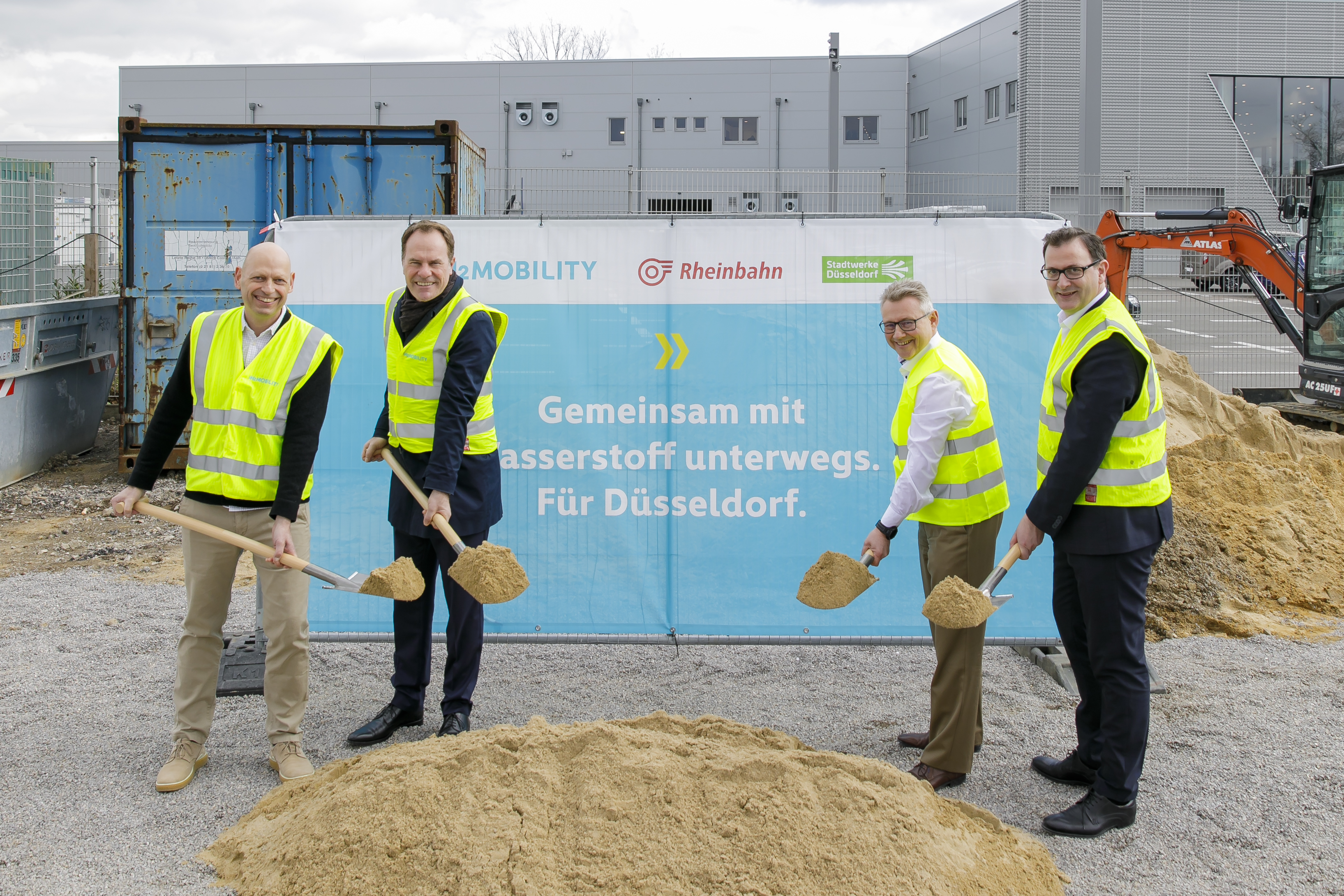 Düsseldorf, 19 March 2024 | With a symbolic ground-breaking ceremony, H2 MOBILITY Deutschland, Stadtwerke Düsseldorf and Rheinbahn start the construction phase of a high-capacity hydrogen refuelling station for the state capital in the presence of Mayor Dr. Stephan Keller. Commissioning is planned for the second half of the year. The project is made possible by the value-adding cooperation between the three partners.
With a daily capacity of two tons, the hydrogen refuelling station will offer ten times the capacity of today’s conventional H2 stations and cover the daily requirements of up to 100 fuel cell buses and trucks. Thanks to patented high-performance technology, up to three vehicles can be refuelled at the same time—including trucks and buses (350 bar) as well as cars and light commercial vehicles, i.e. waste collectors (700 bar). Its high performance makes the refuelling station unique in Europe.
“The start of construction for the first high-performance hydrogen refuelling station in Düsseldorf is a further step towards climate neutrality in 2035. I expressly welcome the fact that Rheinbahn and Stadtwerke are leading the way in cooperation with H2 MOBILITY to promote climate protection in the transport sector. Buses and trains are the backbone of changing mobility behavior. In addition to the expansion of public transport, however, we also need continuous optimization of drive types in this sector. The use of hydrogen and electric buses in the Rheinbahn fleet and the expansion of the associated infrastructure is a benefit for climate protection, air pollution control and modern mobility in the state capital of Düsseldorf. The commitment of the players involved in this project is exemplary,” emphasizes Mayor Dr. Stephan Keller.
Hydrogen: an important component in achieving climate protection targets
The state capital of Düsseldorf wants to become climate-neutral by 2035, including in the transport sector. This is why Stadtwerke Düsseldorf and Rheinbahn are cooperating with the experienced hydrogen refuelling station operator H2 MOBILITY Deutschland. Together, the partners are creating a fertile ecosystem along the hydrogen value chain.
Stadtwerke Düsseldorf is investing in an electrolyzer to be able to produce climate-friendly hydrogen on site in the future. Rheinbahn is procuring 20 fuel cell buses as part of the conversion of its fleet to climate-friendly drives. 10 buses have already been delivered and a further 10 buses are on order. H2 MOBILITY Deutschland is building a public hydrogen refuelling station where all fuel cell vehicles can refuel with renewable hydrogen.
“The construction project shows that municipal partnerships along the value chain—from hydrogen production to infrastructure—have an accelerating effect on the realization of the transport transition. This hydrogen refuelling station serves local public transport, heavy goods vehicles from local businesses and private cars. Thanks to our patented refuelling technology, high-performance refuelling of several buses and trucks in a row at at least three dispensers is possible at the same time. As a result, Rheinbahn and many other customers are already benefiting this year from the latest technology and the advantages of hydrogen propulsion—short refuelling times with a long range,” explains Frank Fronzke, Managing Director and COO at H2 MOBILITY Deutschland.
Climate-friendly hydrogen for mobility
In the course of 2026, climate-friendly hydrogen will be produced by an electrolyzer that will be built on the premises of Stadtwerke Düsseldorf and delivered from there to the refuelling station on the neighboring property via pipeline. The electricity for the electrolyzer will be produced at Stadtwerke’s waste combustion plant. This creates a cycle: The energy for the public hydrogen refuelling station is obtained from the city’s waste.
“We are working consistently on implementing our strategy for achieving climate protection targets and continuously improving the quality of life in Düsseldorf as a business location. The investment in hydrogen technology is another important step towards achieving this goal and shows that we can expand infrastructures in such a way that the mobility sector can also make its contribution to achieving the 2035 climate protection target,” says Julien Mounier, Chairman of the Board of Stadtwerke Düsseldorf.
Rheinbahn Chairman of the Supervisory Board Michael Richarz adds: “Rheinbahn stands for mobility and climate protection and is therefore an important partner for achieving the climate targets and for a city worth living in. In view of the City of Düsseldorf’s goal of being climate-neutral by 2035, we are working at full speed to convert our entire bus fleet to emission-free drives and the related infrastructure. In addition to using battery-electric buses, we are currently also gaining experience with hydrogen drive technology. Thanks to the cooperation with H2 MOBILITY and with Stadtwerke Düsseldorf, we will be able to refuel our first 20 hydrogen buses with hydrogen in the direct neighborhood of our depot in Lierenfeld.”
The Düsseldorf-Höherweg hydrogen refuelling station (HyLight3) project is being funded by the Federal Ministry for Digital and Transport Affairs (BMDV) with a total of 3,137,000 EUR as part of the funding guideline for market activation measures under the National Innovation Program Hydrogen and Fuel Cell Technology Phase 2 (NIP2). The funding guideline is coordinated by NOW GmbH and implemented by Projektträger Jülich (PtJ).
Düsseldorf, 19 March 2024 | With a symbolic ground-breaking ceremony, H2 MOBILITY Deutschland, Stadtwerke Düsseldorf and Rheinbahn start the construction phase of a high-capacity hydrogen refuelling station for the state capital in the presence of Mayor Dr. Stephan Keller. Commissioning is planned for the second half of the year. The project is made possible by the value-adding cooperation between the three partners.
With a daily capacity of two tons, the hydrogen refuelling station will offer ten times the capacity of today’s conventional H2 stations and cover the daily requirements of up to 100 fuel cell buses and trucks. Thanks to patented high-performance technology, up to three vehicles can be refuelled at the same time—including trucks and buses (350 bar) as well as cars and light commercial vehicles, i.e. waste collectors (700 bar). Its high performance makes the refuelling station unique in Europe.
“The start of construction for the first high-performance hydrogen refuelling station in Düsseldorf is a further step towards climate neutrality in 2035. I expressly welcome the fact that Rheinbahn and Stadtwerke are leading the way in cooperation with H2 MOBILITY to promote climate protection in the transport sector. Buses and trains are the backbone of changing mobility behavior. In addition to the expansion of public transport, however, we also need continuous optimization of drive types in this sector. The use of hydrogen and electric buses in the Rheinbahn fleet and the expansion of the associated infrastructure is a benefit for climate protection, air pollution control and modern mobility in the state capital of Düsseldorf. The commitment of the players involved in this project is exemplary,” emphasizes Mayor Dr. Stephan Keller.
Hydrogen: an important component in achieving climate protection targets
The state capital of Düsseldorf wants to become climate-neutral by 2035, including in the transport sector. This is why Stadtwerke Düsseldorf and Rheinbahn are cooperating with the experienced hydrogen refuelling station operator H2 MOBILITY Deutschland. Together, the partners are creating a fertile ecosystem along the hydrogen value chain.
Stadtwerke Düsseldorf is investing in an electrolyzer to be able to produce climate-friendly hydrogen on site in the future. Rheinbahn is procuring 20 fuel cell buses as part of the conversion of its fleet to climate-friendly drives. 10 buses have already been delivered and a further 10 buses are on order. H2 MOBILITY Deutschland is building a public hydrogen refuelling station where all fuel cell vehicles can refuel with renewable hydrogen.
“The construction project shows that municipal partnerships along the value chain—from hydrogen production to infrastructure—have an accelerating effect on the realization of the transport transition. This hydrogen refuelling station serves local public transport, heavy goods vehicles from local businesses and private cars. Thanks to our patented refuelling technology, high-performance refuelling of several buses and trucks in a row at at least three dispensers is possible at the same time. As a result, Rheinbahn and many other customers are already benefiting this year from the latest technology and the advantages of hydrogen propulsion—short refuelling times with a long range,” explains Frank Fronzke, Managing Director and COO at H2 MOBILITY Deutschland.
Climate-friendly hydrogen for mobility
In the course of 2026, climate-friendly hydrogen will be produced by an electrolyzer that will be built on the premises of Stadtwerke Düsseldorf and delivered from there to the refuelling station on the neighboring property via pipeline. The electricity for the electrolyzer will be produced at Stadtwerke’s waste combustion plant. This creates a cycle: The energy for the public hydrogen refuelling station is obtained from the city’s waste.
“We are working consistently on implementing our strategy for achieving climate protection targets and continuously improving the quality of life in Düsseldorf as a business location. The investment in hydrogen technology is another important step towards achieving this goal and shows that we can expand infrastructures in such a way that the mobility sector can also make its contribution to achieving the 2035 climate protection target,” says Julien Mounier, Chairman of the Board of Stadtwerke Düsseldorf.
Rheinbahn Chairman of the Supervisory Board Michael Richarz adds: “Rheinbahn stands for mobility and climate protection and is therefore an important partner for achieving the climate targets and for a city worth living in. In view of the City of Düsseldorf’s goal of being climate-neutral by 2035, we are working at full speed to convert our entire bus fleet to emission-free drives and the related infrastructure. In addition to using battery-electric buses, we are currently also gaining experience with hydrogen drive technology. Thanks to the cooperation with H2 MOBILITY and with Stadtwerke Düsseldorf, we will be able to refuel our first 20 hydrogen buses with hydrogen in the direct neighborhood of our depot in Lierenfeld.”
The Düsseldorf-Höherweg hydrogen refuelling station (HyLight3) project is being funded by the Federal Ministry for Digital and Transport Affairs (BMDV) with a total of 3,137,000 EUR as part of the funding guideline for market activation measures under the National Innovation Program Hydrogen and Fuel Cell Technology Phase 2 (NIP2). The funding guideline is coordinated by NOW GmbH and implemented by Projektträger Jülich (PtJ).
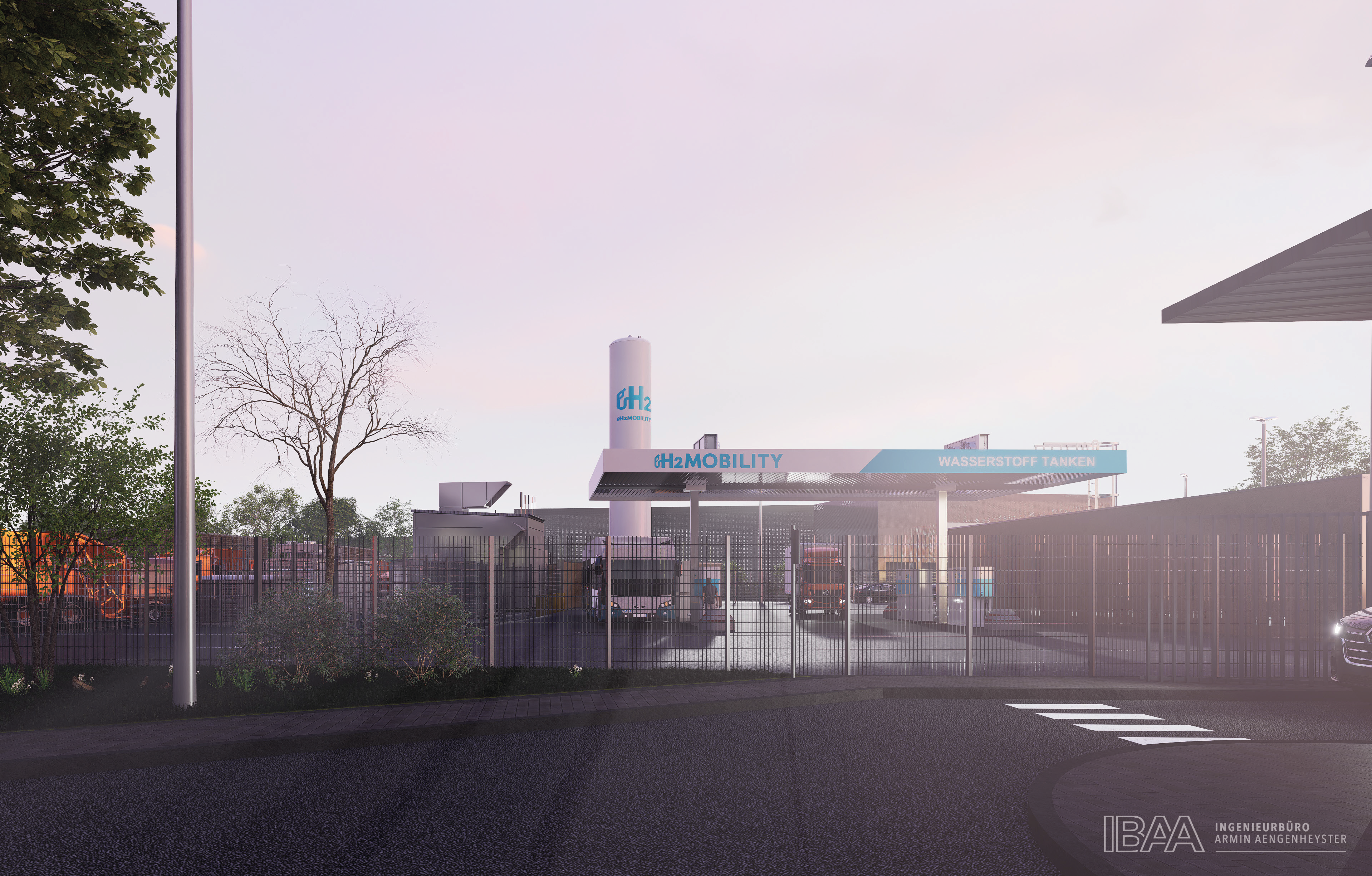
-
Frank Fronzke, Managing Director and COO, H2 MOBILITY Deutschland
-
Dr. Stephan Keller, Mayor of Düsseldorf
-
Michael Richarz, Chairman of the Supervisory Board, Rheinbahn
-
Julien Mounier, Chairman of the Board, Stadtwerke Düsseldorf
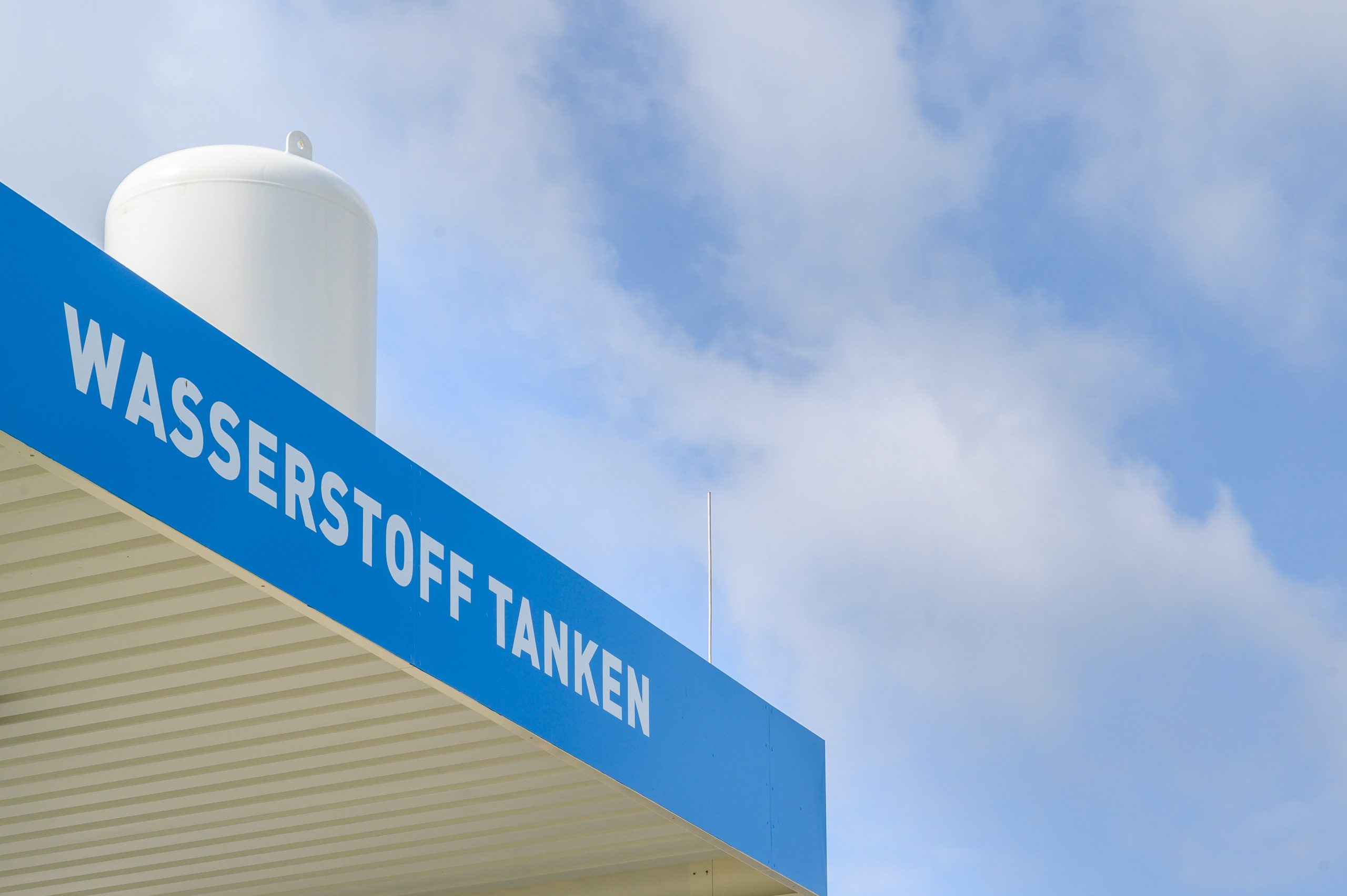 Berlin, February 22, 2024 | Lorenz Jung is leaving the management of H2 MOBILITY Germany at the end of the month. As CCO, Jung, who took over the co-management position in April 2023, was responsible for Product and Project Development, Sales and Communications. He also held the role of management spokesperson.
“After lengthy and intensive discussions, it became clear that the parties had different views on the business objectives and the future direction of the company and that the time was right to create space and provide new impetus by mutual agreement,” says Nikolas Iwan, Chairman of the Advisory Board of H2 MOBILITY Germany. “The shareholders and I would like to thank Mr. Jung for his passionate commitment and the pioneering work he has done. Both have decisively advanced the company and were an important building block for the progress of climate-friendly hydrogen mobility. We wish him all the best and success for the future.”
H2 MOBILITY Deutschland GmbH & Co. KG is the builder and operator of the largest public hydrogen filling station network in Europe. The company’s medium-term goal is to consistently implement an ambitious growth strategy with green hydrogen and to strengthen H2 MOBILITY Germany as the market leader for high-performance public hydrogen filling stations for light and heavy commercial vehicles, trucks and buses.
H2 MOBILITY Germany will continue to be managed by Co-Managing Directors Martin Jüngel and Frank Fronzke. Vacant positions have been filled internally.
Berlin, February 22, 2024 | Lorenz Jung is leaving the management of H2 MOBILITY Germany at the end of the month. As CCO, Jung, who took over the co-management position in April 2023, was responsible for Product and Project Development, Sales and Communications. He also held the role of management spokesperson.
“After lengthy and intensive discussions, it became clear that the parties had different views on the business objectives and the future direction of the company and that the time was right to create space and provide new impetus by mutual agreement,” says Nikolas Iwan, Chairman of the Advisory Board of H2 MOBILITY Germany. “The shareholders and I would like to thank Mr. Jung for his passionate commitment and the pioneering work he has done. Both have decisively advanced the company and were an important building block for the progress of climate-friendly hydrogen mobility. We wish him all the best and success for the future.”
H2 MOBILITY Deutschland GmbH & Co. KG is the builder and operator of the largest public hydrogen filling station network in Europe. The company’s medium-term goal is to consistently implement an ambitious growth strategy with green hydrogen and to strengthen H2 MOBILITY Germany as the market leader for high-performance public hydrogen filling stations for light and heavy commercial vehicles, trucks and buses.
H2 MOBILITY Germany will continue to be managed by Co-Managing Directors Martin Jüngel and Frank Fronzke. Vacant positions have been filled internally. 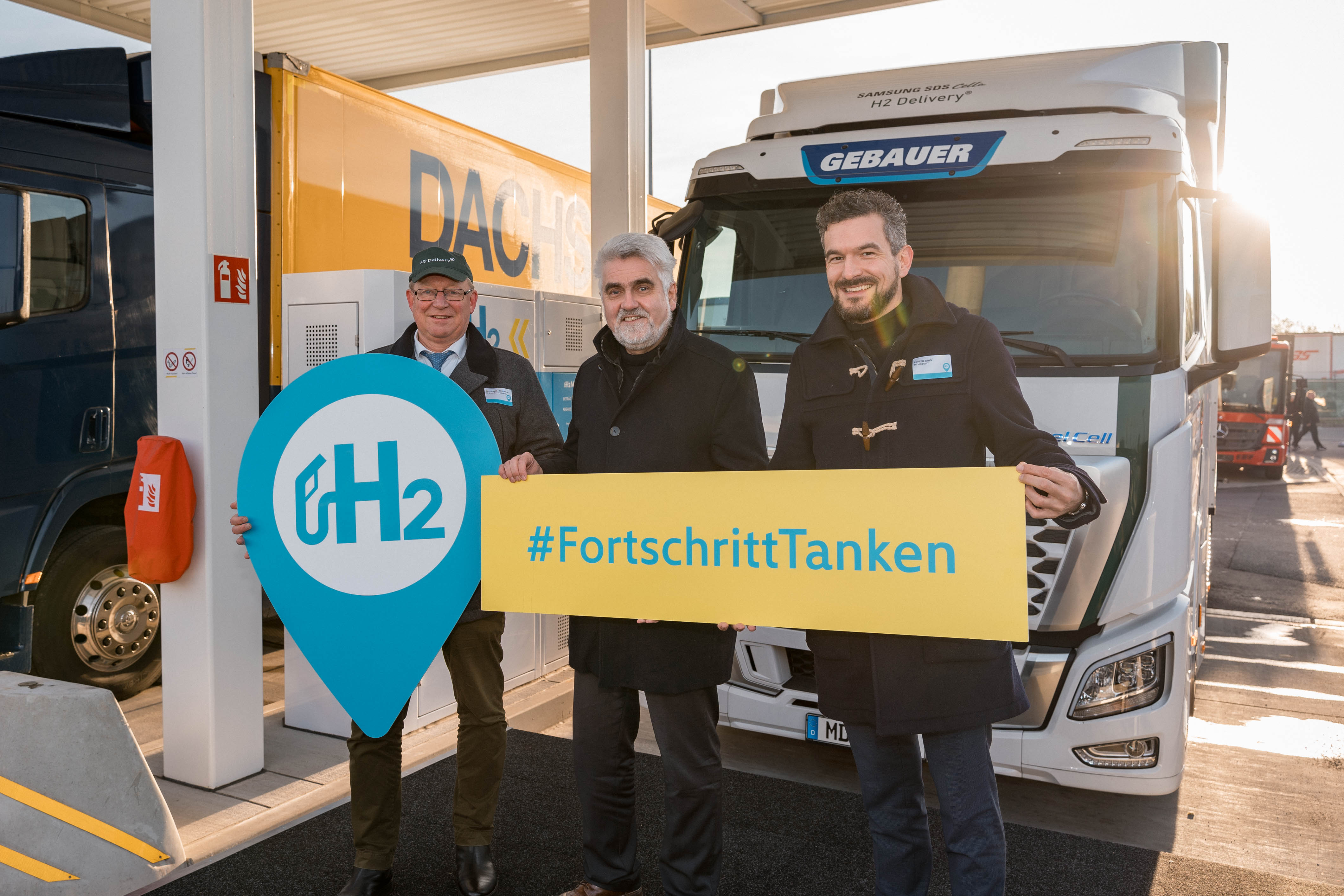 Magdeburg, 22 November 2023 | In the presence of Deputy Prime Minister and State Minister for Science, Energy, Climate, Protection and Environment of the Federal State of Saxony-Anhalt , Prof. Dr. Armin Willingmann, hydrogen refuelling station developer and operator H2 MOBILITY Deutschland and hydrogen investor H2 Green Power & Logistics opened a new hydrogen refuelling station for trucks today. This now allows hydrogen trucks to refuel in the state capital.
Willingmann welcomes the investment in the modern refuelling station: “Sustainable mobility needs hydrogen; this is especially true for heavy goods traffic. To ensure that goods and merchandise get from A to B in the most climate-friendly way possible in the future, it is important that this hydrogen is increasingly produced using renewable energies. The Ministry of Energy is therefore strengthening the production of and research into green hydrogen in Saxony-Anhalt.”
Mayor Simone Borris is pleased about the hydrogen refuelling station for trucks in Magdeburg and its importance for the region: “Hydrogen is an environmentally friendly energy source of the future and is comparatively easy to transport! The investment therefore fits perfectly into our urban climate protection strategy. Our industrial estate in Rothensee is exactly the right location for the new hydrogen refuelling station, as the surrounding companies in particular will benefit from the logistical conditions and good transport links. I would like to thank the investor and all the companies involved in the construction!”
Responsible for the construction and operation of the hydrogen filling station is H2 MOBILITY Deutschland GmbH & Co. KG, which has been driving the expansion of hydrogen infrastructure in Germany since 2015. The filling station’s dispenser is an innovation from H2 MOBILTY Deutschland, which the company developed independently and has applied for a patent for. The product is based on the experience of thousands of fuelling processes and combines intelligent control and technology in the smallest possible space. It therefore meets the demanding requirements for reliable high-performance refuelling of several trucks in succession.
“A fertile ecosystem of infrastructure and local logistics companies has been created at Glindenberger Weg with our hydrogen truck filling station. The location is a role model for logistics, which is already relying on sustainable drive systems. DACHSER, Norma and Samsung SDS are already demonstrating in practical tests with Hyundai H2 delivery trucks, model XCIENT Fuell Cell, how easy the switch is. The retail and logistics companies run regular routes from here to Berlin, Leipzig and Hanover. With our massive expansion of the 350-bar network, there are more and more opportunities to switch to hydrogen in heavy goods transport – in other regions of Germany too,” explains Lorenz Jung, Managing Director and CCO of H2 MOBILITY Deutschland.
The hydrogen filling station for trucks at the TotalEnergies Autohof Magdeburg, Glindenberger Weg 3, is conveniently located directly on the A2 and closes the gap for the transportation of goods with hydrogen between Magdeburg and Hanover, Berlin and Leipzig. The transport companies DACHSER, the food discounter Norma and Samsung SDS are already making use of the hydrogen refuelling service.
For H2 GreenPowerLog CEO Dr. Ludger Hellenthal, the opening of the new hydrogen filling station for trucks is “another step towards the energy transition on the road.” H2 GreenPowerLog has been supplying trucks in the food industry with green hydrogen since the end of 2022, collaborates with logistics service providers and offers a complete ecosystem for green commercial vehicle mobility in all sectors. The company is also quattromodal on the road with green hydrogen by rail, ship and pipeline connection.
Three Hyundai XCIENT Fuel Cell trucks, as well as a FAUN ENGIUNIUS BLUPOWER H2 waste collection vehicle and an Iveco Daily FCEV were presented at the opening. H2 MOBILITY Deutschland received €400,000 in funding from the National Innovation Programme for Hydrogen and Fuel Cell Technology (NIP) from the Federal Ministry for Digital and Transport (BMDV) for the construction of the hydrogen truck station.
Pioneer in Europe: H2 MOBILITY station network
Currently, fuel cell vehicles can refuel at 700 bar at over 80 public H2 MOBILITY refuelling stations in Germany, including passenger cars and smaller commercial vehicles as well as refuse collectors. Five additional refuelling stations are in the planning, construction or commissioning stages. Refuelling at 350 bar is possible for buses and trucks at 15 stations. Further expansion will be demand-driven, including along the TEN-T corridors for commercial vehicles. 27 refuelling options for 350 bar are currently being implemented. Five further filling stations for 700 bar are currently being planned, built or commissioned.
About H2 MOBILITY
H2 MOBILITY Deutschland is a pioneer in the development of a public hydrogen refuelling network and Europe’s largest operator of public hydrogen stations. Its business areas include technical development, financing, planning, construction, marketing and operation of the stations. H2 MOBILITY Deutschland was founded in 2015 as a project company with the aim of promoting hydrogen as an emission-free fuel in road transport. In 2022, the project company became a long-term, commercially oriented company with the goal of contributing to the energy transition in transport through a high-performance hydrogen filling station network.
About H2 Green Power & Logistics
The business model of H2 Green Power & Logistics GmbH, headquartered in Münster and with a branch in Magdeburg, comprises a complete ecosystem for green hydrogen in commercial vehicle mobility under its sales brand H2 Delivery. H2 GreenPowerLog has been investing in renewable energies alongside its land holdings since 2010.
Press contacts: H2 MOBILITY Deutschland: Daniela Dietz, presse@h2-mobility.de
More information at www.h2-mobility.de and https://www.h2greenpowerlog.de
Photo above (f.l.t.r.): Dr. Ludger Hellenthal, H2 Green Power & Logistics, Deputy Prime Minister and State Minister Prof. Dr. Armin Willingmann, Lorenz Jung, H2 MOBILITY
Magdeburg, 22 November 2023 | In the presence of Deputy Prime Minister and State Minister for Science, Energy, Climate, Protection and Environment of the Federal State of Saxony-Anhalt , Prof. Dr. Armin Willingmann, hydrogen refuelling station developer and operator H2 MOBILITY Deutschland and hydrogen investor H2 Green Power & Logistics opened a new hydrogen refuelling station for trucks today. This now allows hydrogen trucks to refuel in the state capital.
Willingmann welcomes the investment in the modern refuelling station: “Sustainable mobility needs hydrogen; this is especially true for heavy goods traffic. To ensure that goods and merchandise get from A to B in the most climate-friendly way possible in the future, it is important that this hydrogen is increasingly produced using renewable energies. The Ministry of Energy is therefore strengthening the production of and research into green hydrogen in Saxony-Anhalt.”
Mayor Simone Borris is pleased about the hydrogen refuelling station for trucks in Magdeburg and its importance for the region: “Hydrogen is an environmentally friendly energy source of the future and is comparatively easy to transport! The investment therefore fits perfectly into our urban climate protection strategy. Our industrial estate in Rothensee is exactly the right location for the new hydrogen refuelling station, as the surrounding companies in particular will benefit from the logistical conditions and good transport links. I would like to thank the investor and all the companies involved in the construction!”
Responsible for the construction and operation of the hydrogen filling station is H2 MOBILITY Deutschland GmbH & Co. KG, which has been driving the expansion of hydrogen infrastructure in Germany since 2015. The filling station’s dispenser is an innovation from H2 MOBILTY Deutschland, which the company developed independently and has applied for a patent for. The product is based on the experience of thousands of fuelling processes and combines intelligent control and technology in the smallest possible space. It therefore meets the demanding requirements for reliable high-performance refuelling of several trucks in succession.
“A fertile ecosystem of infrastructure and local logistics companies has been created at Glindenberger Weg with our hydrogen truck filling station. The location is a role model for logistics, which is already relying on sustainable drive systems. DACHSER, Norma and Samsung SDS are already demonstrating in practical tests with Hyundai H2 delivery trucks, model XCIENT Fuell Cell, how easy the switch is. The retail and logistics companies run regular routes from here to Berlin, Leipzig and Hanover. With our massive expansion of the 350-bar network, there are more and more opportunities to switch to hydrogen in heavy goods transport – in other regions of Germany too,” explains Lorenz Jung, Managing Director and CCO of H2 MOBILITY Deutschland.
The hydrogen filling station for trucks at the TotalEnergies Autohof Magdeburg, Glindenberger Weg 3, is conveniently located directly on the A2 and closes the gap for the transportation of goods with hydrogen between Magdeburg and Hanover, Berlin and Leipzig. The transport companies DACHSER, the food discounter Norma and Samsung SDS are already making use of the hydrogen refuelling service.
For H2 GreenPowerLog CEO Dr. Ludger Hellenthal, the opening of the new hydrogen filling station for trucks is “another step towards the energy transition on the road.” H2 GreenPowerLog has been supplying trucks in the food industry with green hydrogen since the end of 2022, collaborates with logistics service providers and offers a complete ecosystem for green commercial vehicle mobility in all sectors. The company is also quattromodal on the road with green hydrogen by rail, ship and pipeline connection.
Three Hyundai XCIENT Fuel Cell trucks, as well as a FAUN ENGIUNIUS BLUPOWER H2 waste collection vehicle and an Iveco Daily FCEV were presented at the opening. H2 MOBILITY Deutschland received €400,000 in funding from the National Innovation Programme for Hydrogen and Fuel Cell Technology (NIP) from the Federal Ministry for Digital and Transport (BMDV) for the construction of the hydrogen truck station.
Pioneer in Europe: H2 MOBILITY station network
Currently, fuel cell vehicles can refuel at 700 bar at over 80 public H2 MOBILITY refuelling stations in Germany, including passenger cars and smaller commercial vehicles as well as refuse collectors. Five additional refuelling stations are in the planning, construction or commissioning stages. Refuelling at 350 bar is possible for buses and trucks at 15 stations. Further expansion will be demand-driven, including along the TEN-T corridors for commercial vehicles. 27 refuelling options for 350 bar are currently being implemented. Five further filling stations for 700 bar are currently being planned, built or commissioned.
About H2 MOBILITY
H2 MOBILITY Deutschland is a pioneer in the development of a public hydrogen refuelling network and Europe’s largest operator of public hydrogen stations. Its business areas include technical development, financing, planning, construction, marketing and operation of the stations. H2 MOBILITY Deutschland was founded in 2015 as a project company with the aim of promoting hydrogen as an emission-free fuel in road transport. In 2022, the project company became a long-term, commercially oriented company with the goal of contributing to the energy transition in transport through a high-performance hydrogen filling station network.
About H2 Green Power & Logistics
The business model of H2 Green Power & Logistics GmbH, headquartered in Münster and with a branch in Magdeburg, comprises a complete ecosystem for green hydrogen in commercial vehicle mobility under its sales brand H2 Delivery. H2 GreenPowerLog has been investing in renewable energies alongside its land holdings since 2010.
Press contacts: H2 MOBILITY Deutschland: Daniela Dietz, presse@h2-mobility.de
More information at www.h2-mobility.de and https://www.h2greenpowerlog.de
Photo above (f.l.t.r.): Dr. Ludger Hellenthal, H2 Green Power & Logistics, Deputy Prime Minister and State Minister Prof. Dr. Armin Willingmann, Lorenz Jung, H2 MOBILITY
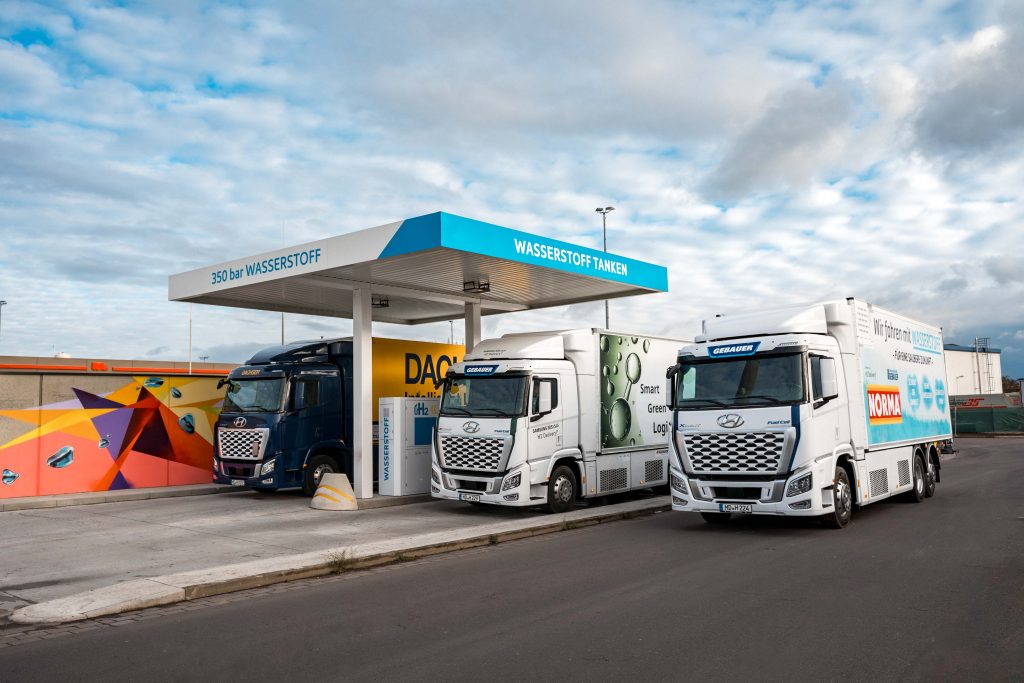 Photo 2: H2-Trucks from DACHSER, Samsung SDS and Norma
Photo 2: H2-Trucks from DACHSER, Samsung SDS and Norma
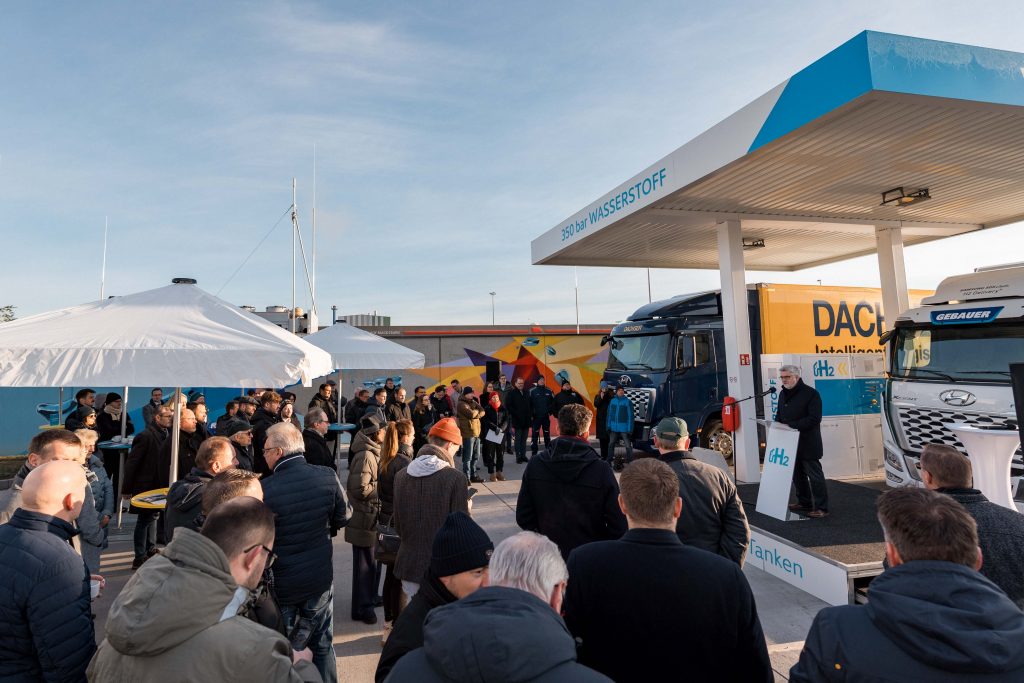 Photo 3: Impression of the ceremony
Photo 3: Impression of the ceremony 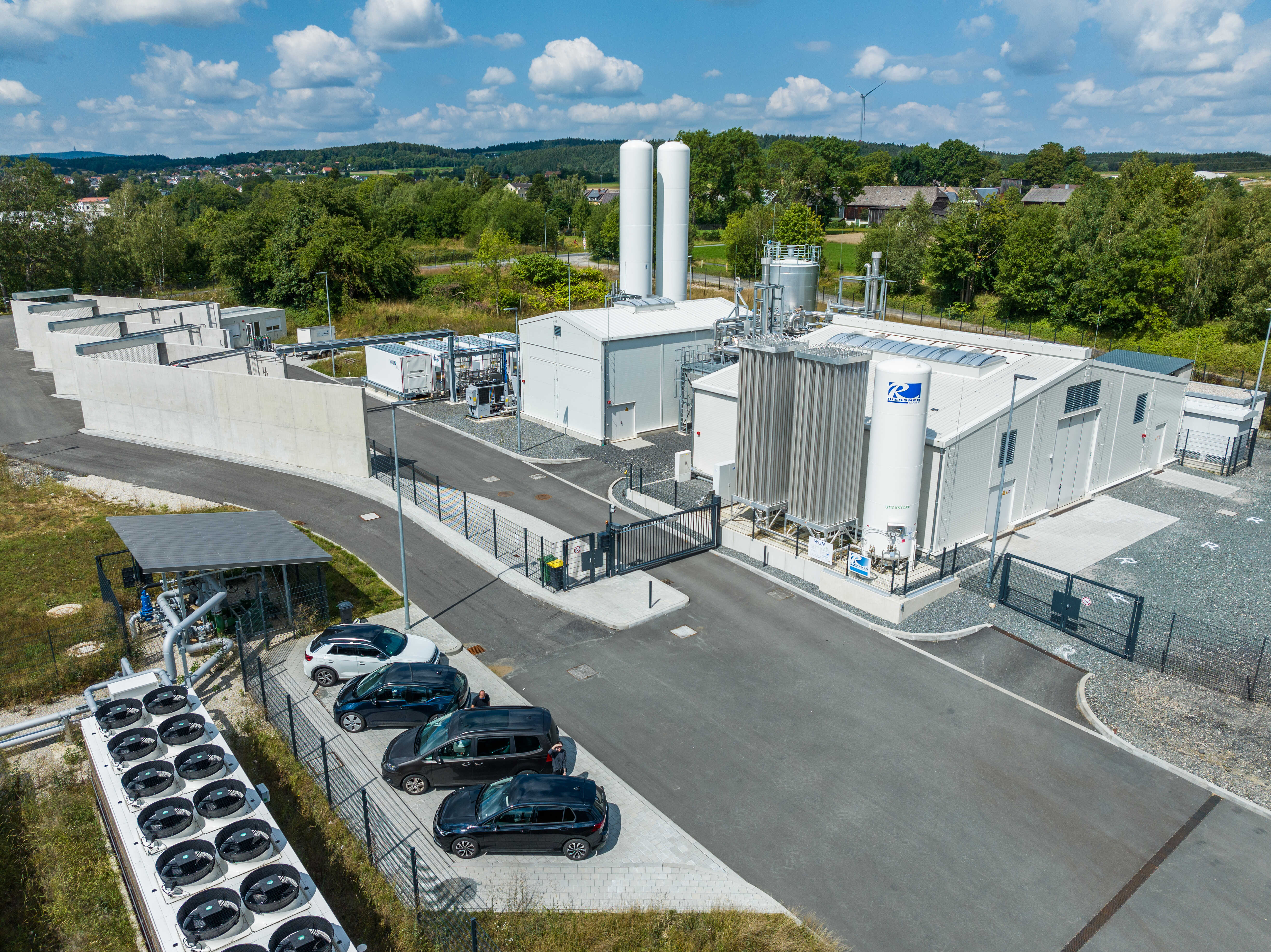 Berlin, 10/18/2023 | Since October 1, customers refuel with regenerative hydrogen (H2) at the H2 MOBILITY stations in Dresden and Berg bei Hof. The hydrogen produced in a PEM electrolysis process, is supplied by Rießner Gase.
From the electrolysis plant of the company WUN H2, in which Rießner Gase holds shares, the filling stations in Dresden and Berg near Hof are being supplied with green hydrogen, i.e. hydrogen produced from renewable energies, since 1 October 2023. This is based on a supply agreement that H2 MOBILITY Deutschland recently concluded with the family-owned company.
The H2 production facility, which was built in the Wunsiedel Energy Park together with Stadtwerke Wunsiedel and Siemens, is considered the largest in Bavaria. Today, it produces 960 t of hydrogen per year from solar and wind power. In a second development stage, the electrolyser is to be expanded to 17.5 MW. “We see a strong demand for our green hydrogen. Therefore, the considerations for the expansion are already very concrete. As soon as we receive sufficient funding for the enlargement, we will start implementing it,” says Dr. Thilo Rießner, Managing Director at Rießner Gase.
H2 MOBILITY Deutschland, operator of the largest network of public hydrogen filling stations in Europe, has set itself the goal of transitioning completely to green hydrogen by 2028. With the start-up of industrial-scale electrolysers in Germany, this is now possible for the first refuelling stations. “Thanks to the progressive undertaking of Rießner Gase, we can already offer green hydrogen at the first filling stations – an important step towards the decarbonization of road transport,” explains Lorenz Jung, Managing Director and CCO at H2 MOBILITY Deutschland.
With the legal certainty that has arisen at the EU level through the Delegated Acts of the Renewable Energy Directive (RED II), H2 MOBILITY Deutschland relies exclusively on green hydrogen according to EU standards to supply its station network. “Our clear goal is to switch completely to renewable hydrogen by 2028. Innovative partners like Rießner Gase support us on this path. We are pleased to have exemplary companions along the way,” said Lorenz Jung.
H2 MOBILITY Deutschland passes on the price advantage of regeneratively produced H2 to its customers. For example, green H2 at H2 MOBILITY stations costs €9.50/kg H2 for 350-bar refuelling and €11/kg H2 for 700 bar. In comparison, prices for grey, conventionally produced hydrogen at H2 MOBILITY stations range from €12.85/kg H2 to €15.25/kg H2.
Pioneer in Europe: H2 MOBILITY station network
Currently, fuel cell vehicles can refuel at 700 bar at over 80 public H2 MOBILITY refuelling stations in Germany, including passenger cars and smaller commercial vehicles as well as refuse collectors. Five additional refuelling stations are in the planning, construction or commissioning stages. Refuelling at 350 bar is possible for buses and trucks at 15 stations. Further expansion will be demand-driven, including along the TEN-T corridors for commercial vehicles. 27 refuelling options for 350 bar are currently being implemented.
About H2 MOBILITY
H2 MOBILITY Deutschland is a pioneer in the development of a public hydrogen refuelling network and Europe’s largest operator of public hydrogen stations. Its business areas include technical development, financing, planning, construction, marketing and operation of the stations. H2 MOBILITY Deutschland was founded in 2015 as a project company with the aim of promoting hydrogen as an emission-free fuel in road transport. In 2022, the project company became a long-term, commercially oriented company with the goal of contributing to the energy transition in transport through a high-performance hydrogen filling station network.
About Rießner Gase
In the 77 years since its foundation, the family-owned company has become a leading regional supplier of technical and medical gases, food, test and special gases as well as propane. In the meantime, in addition to the base in Lichtenfels, there are Rießner locations in Chemnitz, Frankfurt am Main, Wunsiedel and the Czech Republic. In addition, there are more than 100 distribution warehouses throughout Germany and the Czech Republic.
Contact:
H2 MOBILITY Deutschland: Daniela Dietz, presse@h2-mobility.de
Further information at www.h2-mobility.de
Berlin, 10/18/2023 | Since October 1, customers refuel with regenerative hydrogen (H2) at the H2 MOBILITY stations in Dresden and Berg bei Hof. The hydrogen produced in a PEM electrolysis process, is supplied by Rießner Gase.
From the electrolysis plant of the company WUN H2, in which Rießner Gase holds shares, the filling stations in Dresden and Berg near Hof are being supplied with green hydrogen, i.e. hydrogen produced from renewable energies, since 1 October 2023. This is based on a supply agreement that H2 MOBILITY Deutschland recently concluded with the family-owned company.
The H2 production facility, which was built in the Wunsiedel Energy Park together with Stadtwerke Wunsiedel and Siemens, is considered the largest in Bavaria. Today, it produces 960 t of hydrogen per year from solar and wind power. In a second development stage, the electrolyser is to be expanded to 17.5 MW. “We see a strong demand for our green hydrogen. Therefore, the considerations for the expansion are already very concrete. As soon as we receive sufficient funding for the enlargement, we will start implementing it,” says Dr. Thilo Rießner, Managing Director at Rießner Gase.
H2 MOBILITY Deutschland, operator of the largest network of public hydrogen filling stations in Europe, has set itself the goal of transitioning completely to green hydrogen by 2028. With the start-up of industrial-scale electrolysers in Germany, this is now possible for the first refuelling stations. “Thanks to the progressive undertaking of Rießner Gase, we can already offer green hydrogen at the first filling stations – an important step towards the decarbonization of road transport,” explains Lorenz Jung, Managing Director and CCO at H2 MOBILITY Deutschland.
With the legal certainty that has arisen at the EU level through the Delegated Acts of the Renewable Energy Directive (RED II), H2 MOBILITY Deutschland relies exclusively on green hydrogen according to EU standards to supply its station network. “Our clear goal is to switch completely to renewable hydrogen by 2028. Innovative partners like Rießner Gase support us on this path. We are pleased to have exemplary companions along the way,” said Lorenz Jung.
H2 MOBILITY Deutschland passes on the price advantage of regeneratively produced H2 to its customers. For example, green H2 at H2 MOBILITY stations costs €9.50/kg H2 for 350-bar refuelling and €11/kg H2 for 700 bar. In comparison, prices for grey, conventionally produced hydrogen at H2 MOBILITY stations range from €12.85/kg H2 to €15.25/kg H2.
Pioneer in Europe: H2 MOBILITY station network
Currently, fuel cell vehicles can refuel at 700 bar at over 80 public H2 MOBILITY refuelling stations in Germany, including passenger cars and smaller commercial vehicles as well as refuse collectors. Five additional refuelling stations are in the planning, construction or commissioning stages. Refuelling at 350 bar is possible for buses and trucks at 15 stations. Further expansion will be demand-driven, including along the TEN-T corridors for commercial vehicles. 27 refuelling options for 350 bar are currently being implemented.
About H2 MOBILITY
H2 MOBILITY Deutschland is a pioneer in the development of a public hydrogen refuelling network and Europe’s largest operator of public hydrogen stations. Its business areas include technical development, financing, planning, construction, marketing and operation of the stations. H2 MOBILITY Deutschland was founded in 2015 as a project company with the aim of promoting hydrogen as an emission-free fuel in road transport. In 2022, the project company became a long-term, commercially oriented company with the goal of contributing to the energy transition in transport through a high-performance hydrogen filling station network.
About Rießner Gase
In the 77 years since its foundation, the family-owned company has become a leading regional supplier of technical and medical gases, food, test and special gases as well as propane. In the meantime, in addition to the base in Lichtenfels, there are Rießner locations in Chemnitz, Frankfurt am Main, Wunsiedel and the Czech Republic. In addition, there are more than 100 distribution warehouses throughout Germany and the Czech Republic.
Contact:
H2 MOBILITY Deutschland: Daniela Dietz, presse@h2-mobility.de
Further information at www.h2-mobility.de
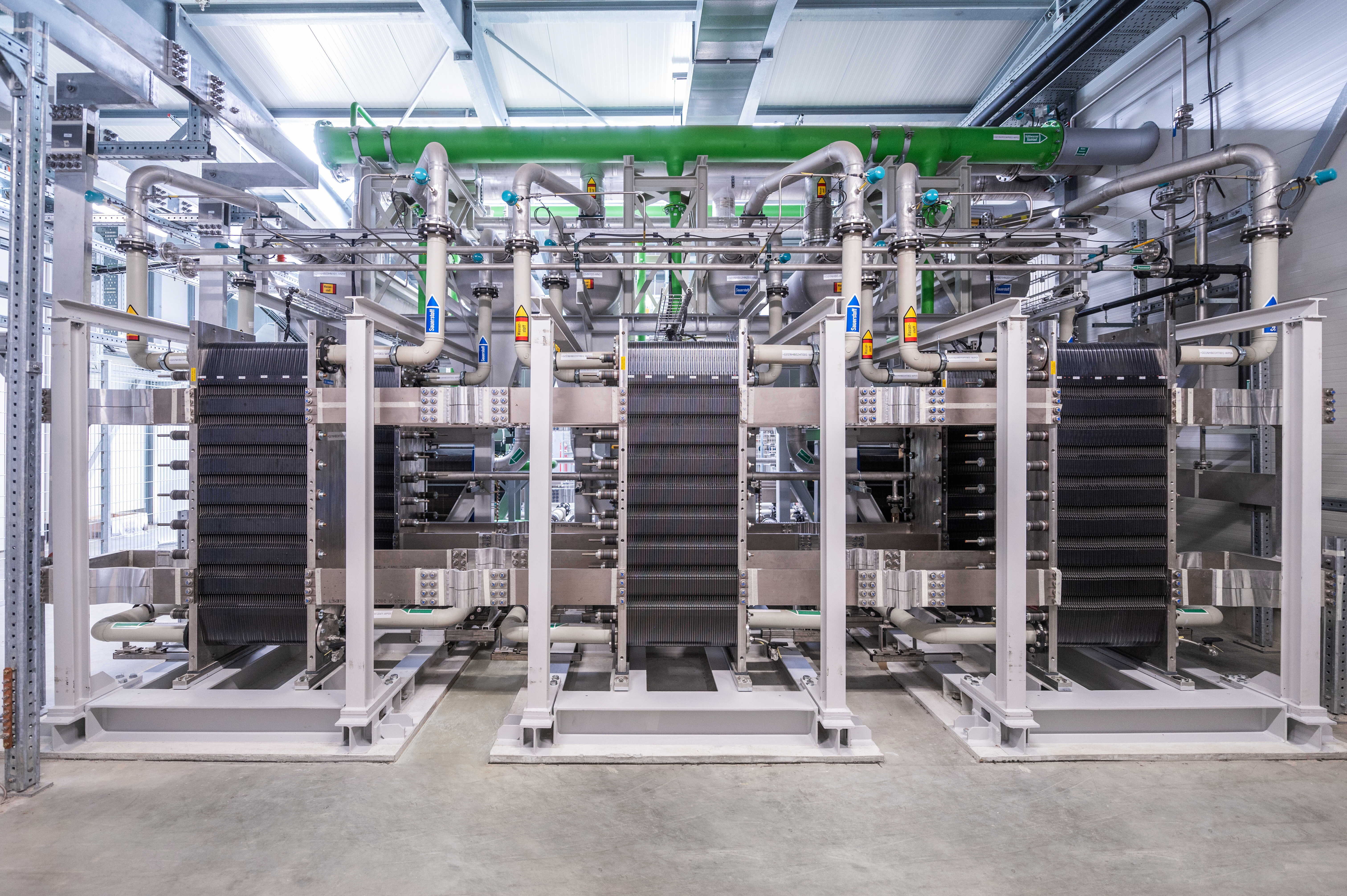
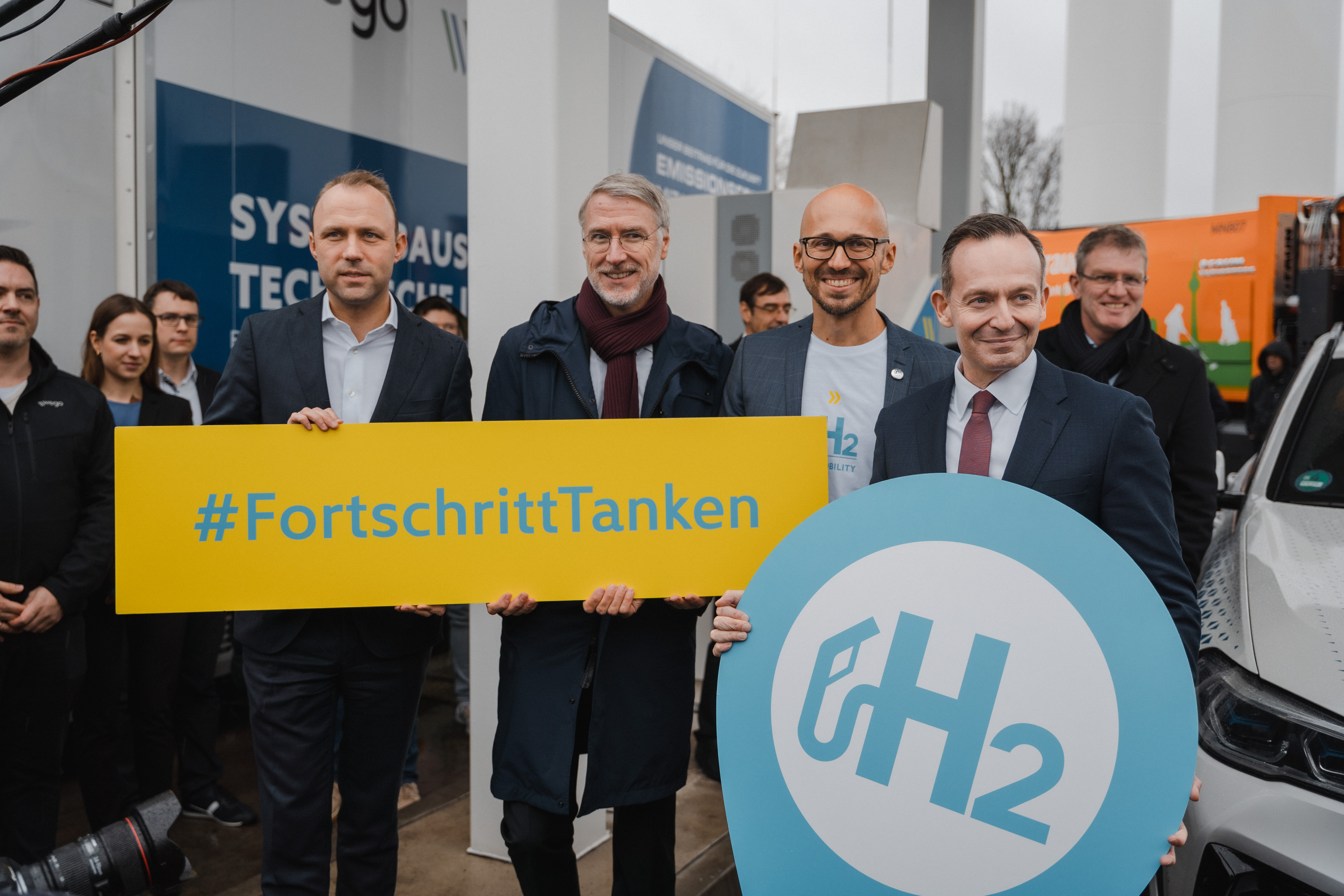 Berlin, 11 January 2023 | The H2 MOBILITY Deutschland hydrogen station at the Shell filling station Tempelhofer Weg 102 was opened today in the presence of Federal Transport Minister Dr. Volker Wissing: Fuel cell trucks, waste collectors, cars, and light commercial vehicles can now refuel with hydrogen (H2) here.
The Tempelhofer Weg hydrogen filling station is one of Germany’s most efficient station as of today and is central to the further ramp-up of hydrogen mobility in the German capital: Nowhere else is the volume of H2 vehicles growing as fast as in Berlin.
Federal Minister Dr Volker Wissing: “Hydrogen and fuel cell technologies are an important building block for climate-friendly mobility. For this reason, the Federal Ministry for Transport is funding the deployment of a basic network of publicly accessible hydrogen filling stations. We are taking the lead and laying the foundations for climate-neutral road transport. For people and businesses to increasingly rely on alternative drivetrains, we need robust and widely available infrastructure. Hydrogen-powered vehicles will only be used if hydrogen filling stations are available across the country. We have joined forces with industry to achieve this goal.”
At the Tempelhofer Weg station, not only the BSR waste collectors will be refuelling in future, but also the fleet of “H2 move Berlin”, which is to grow to over 200 Toyota Mirai in the driving service by summer 2023. In addition, the first hydrogen trucks will be delivered to customers nearby, including in Hylane rental service, in Berlin in the spring of 2023.
Wolfgang Wüllhorst, Head of Fleet Management, Berliner Stadtreinigung: “Putting applications such as waste disposal for a transformed climate-friendly, modern mobility on to the road on a daily basis in a stable way requires enormous efforts and a lot of expertise at all levels. I am delighted that the first truly high-performance H2 filling station is now coming online in Berlin. This supports us in the transformation and provides a necessary infrastructural service improvement for our operational processes.”
Thomas Mohnke, Senior Executive Partner SafeDriver Group, operator of the “H2 moves Berlin” fleet: “Hydrogen is also an ideal fuel for cars and vans in continuous operation. Refuelling takes just a few minutes, the ranges are suitable for everyday use and multi-shift operation can be implemented at any time. Public transport authorities in particular are dependent on reliable operating conditions around the clock.”
Sara Schiffer, Managing Director Hylane: “Our tenants have been on the road with hydrogen trucks in Germany since the end of last year. The expansion of the refuelling infrastructure gives our customers increasing flexibility in planning their routes and ensures a reliable hydrogen supply through regional redundancies. This is important because we need more vehicles with sustainable drives, especially in heavy goods transport, in order to achieve climate protection targets.”
After completion of the commissioning process, the hydrogen filling station is now regularly available for refuelling hydrogen trucks at 350 bar (H2 buses and trucks) and at 700 bar (H2 passenger cars, light commercial vehicles and waste collectors).
The Tempelhofer Weg hydrogen station is conveniently located near the city motorway 100 and the A 113 near the BSR service yard in the south of Berlin. It is Berlin’s fifth hydrogen station. Europe’s leading operator of hydrogen filling stations, H2 MOBILITY Deutschland, is responsible for the hydrogen filling station’s construction and operation. The filling station technology at the new H2 filling station is supplied by the industrial gases and technology company Air Liquide.
Nikolas Iwan, Managing Director of H2 MOBILITY Germany: “With hydrogen at 350 bar, heavy commercial vehicles with e-drives can already refuel at megawatt speeds today – for example here at Tempelhofer Weg in Berlin. Our goal is to add up to 120 more locations across Germany in the next four years.”
Hydrogen is used to power FCEVs (fuel cell electric vehicles). Their advantages: no noise and no pollutants, but the same use, speed, and range as vehicles with petrol or diesel engines. Hydrogen cars have ranges of up to 700 kilometres and refuel in just three to five minutes; waste collectors, like conventional waste collectors, need about 15 minutes to refuel, for a range of up to 400 kilometres.
The construction of the hydrogen filling station was funded with a total of EUR 1.3 million by the Federal Ministry of Digital Affairs and Transport under its National Hydrogen and Fuel Cell Technology Innovation Programme. The funding directive is coordinated by NOW GmbH and implemented by the Jülich Project Management (PtJ).
The hydrogen filling station network in Germany
Fuel-cell vehicle drivers can currently refuel cars, smaller commercial vehicles, and utility vehicles such as waste collectors at 700 bar at nearly 100 public hydrogen filling stations in Germany. 350-bar refuelling for buses and trucks is also possible at some of these stations.
H2 MOBILITY continues to expand the hydrogen filling station infrastructure in focus regions and along the TEN-T corridors in line with demand. In addition, existing 700-bar hydrogen filling stations will be expanded short-term to include 350-bar pumps.
Foto I: Federal Minister Dr Volker Wissing; MdA Berlin Sebastian Czaja, Nikolas Iwan, CEO H2 MOBILITY Deutschland; Kurt-Christoph von Knobelsdorff, CEO NOW
Foto II: Michael Abersfelder, Geschäftsführer Wego; MdA Berlin Sebastian Czaja; Andreas Janssen, Head of Hydrogen Mobility Europe Shell; Sara Schiffer, Geschäftsführerin Hylane; Kurt-Christoph von Knobelsdorff, Geschäftsführer der NOW; Lars-Peter Thiessen, Leiter Einführung Strategie Wasserstoff und Brennstoffzelle Opel; Nikolas Iwan, Geschäftsführer H2 MOBILITY Deutschland; Bundesverkehrsminister Dr. Volker Wissing; Wolfgang Wüllhorst, Leiter Fuhrparkmanagement Berliner Stadtreinigung; Jürgen Guldner, General Programm Manager Hydrogen Technology BMW
Berlin, 11 January 2023 | The H2 MOBILITY Deutschland hydrogen station at the Shell filling station Tempelhofer Weg 102 was opened today in the presence of Federal Transport Minister Dr. Volker Wissing: Fuel cell trucks, waste collectors, cars, and light commercial vehicles can now refuel with hydrogen (H2) here.
The Tempelhofer Weg hydrogen filling station is one of Germany’s most efficient station as of today and is central to the further ramp-up of hydrogen mobility in the German capital: Nowhere else is the volume of H2 vehicles growing as fast as in Berlin.
Federal Minister Dr Volker Wissing: “Hydrogen and fuel cell technologies are an important building block for climate-friendly mobility. For this reason, the Federal Ministry for Transport is funding the deployment of a basic network of publicly accessible hydrogen filling stations. We are taking the lead and laying the foundations for climate-neutral road transport. For people and businesses to increasingly rely on alternative drivetrains, we need robust and widely available infrastructure. Hydrogen-powered vehicles will only be used if hydrogen filling stations are available across the country. We have joined forces with industry to achieve this goal.”
At the Tempelhofer Weg station, not only the BSR waste collectors will be refuelling in future, but also the fleet of “H2 move Berlin”, which is to grow to over 200 Toyota Mirai in the driving service by summer 2023. In addition, the first hydrogen trucks will be delivered to customers nearby, including in Hylane rental service, in Berlin in the spring of 2023.
Wolfgang Wüllhorst, Head of Fleet Management, Berliner Stadtreinigung: “Putting applications such as waste disposal for a transformed climate-friendly, modern mobility on to the road on a daily basis in a stable way requires enormous efforts and a lot of expertise at all levels. I am delighted that the first truly high-performance H2 filling station is now coming online in Berlin. This supports us in the transformation and provides a necessary infrastructural service improvement for our operational processes.”
Thomas Mohnke, Senior Executive Partner SafeDriver Group, operator of the “H2 moves Berlin” fleet: “Hydrogen is also an ideal fuel for cars and vans in continuous operation. Refuelling takes just a few minutes, the ranges are suitable for everyday use and multi-shift operation can be implemented at any time. Public transport authorities in particular are dependent on reliable operating conditions around the clock.”
Sara Schiffer, Managing Director Hylane: “Our tenants have been on the road with hydrogen trucks in Germany since the end of last year. The expansion of the refuelling infrastructure gives our customers increasing flexibility in planning their routes and ensures a reliable hydrogen supply through regional redundancies. This is important because we need more vehicles with sustainable drives, especially in heavy goods transport, in order to achieve climate protection targets.”
After completion of the commissioning process, the hydrogen filling station is now regularly available for refuelling hydrogen trucks at 350 bar (H2 buses and trucks) and at 700 bar (H2 passenger cars, light commercial vehicles and waste collectors).
The Tempelhofer Weg hydrogen station is conveniently located near the city motorway 100 and the A 113 near the BSR service yard in the south of Berlin. It is Berlin’s fifth hydrogen station. Europe’s leading operator of hydrogen filling stations, H2 MOBILITY Deutschland, is responsible for the hydrogen filling station’s construction and operation. The filling station technology at the new H2 filling station is supplied by the industrial gases and technology company Air Liquide.
Nikolas Iwan, Managing Director of H2 MOBILITY Germany: “With hydrogen at 350 bar, heavy commercial vehicles with e-drives can already refuel at megawatt speeds today – for example here at Tempelhofer Weg in Berlin. Our goal is to add up to 120 more locations across Germany in the next four years.”
Hydrogen is used to power FCEVs (fuel cell electric vehicles). Their advantages: no noise and no pollutants, but the same use, speed, and range as vehicles with petrol or diesel engines. Hydrogen cars have ranges of up to 700 kilometres and refuel in just three to five minutes; waste collectors, like conventional waste collectors, need about 15 minutes to refuel, for a range of up to 400 kilometres.
The construction of the hydrogen filling station was funded with a total of EUR 1.3 million by the Federal Ministry of Digital Affairs and Transport under its National Hydrogen and Fuel Cell Technology Innovation Programme. The funding directive is coordinated by NOW GmbH and implemented by the Jülich Project Management (PtJ).
The hydrogen filling station network in Germany
Fuel-cell vehicle drivers can currently refuel cars, smaller commercial vehicles, and utility vehicles such as waste collectors at 700 bar at nearly 100 public hydrogen filling stations in Germany. 350-bar refuelling for buses and trucks is also possible at some of these stations.
H2 MOBILITY continues to expand the hydrogen filling station infrastructure in focus regions and along the TEN-T corridors in line with demand. In addition, existing 700-bar hydrogen filling stations will be expanded short-term to include 350-bar pumps.
Foto I: Federal Minister Dr Volker Wissing; MdA Berlin Sebastian Czaja, Nikolas Iwan, CEO H2 MOBILITY Deutschland; Kurt-Christoph von Knobelsdorff, CEO NOW
Foto II: Michael Abersfelder, Geschäftsführer Wego; MdA Berlin Sebastian Czaja; Andreas Janssen, Head of Hydrogen Mobility Europe Shell; Sara Schiffer, Geschäftsführerin Hylane; Kurt-Christoph von Knobelsdorff, Geschäftsführer der NOW; Lars-Peter Thiessen, Leiter Einführung Strategie Wasserstoff und Brennstoffzelle Opel; Nikolas Iwan, Geschäftsführer H2 MOBILITY Deutschland; Bundesverkehrsminister Dr. Volker Wissing; Wolfgang Wüllhorst, Leiter Fuhrparkmanagement Berliner Stadtreinigung; Jürgen Guldner, General Programm Manager Hydrogen Technology BMW
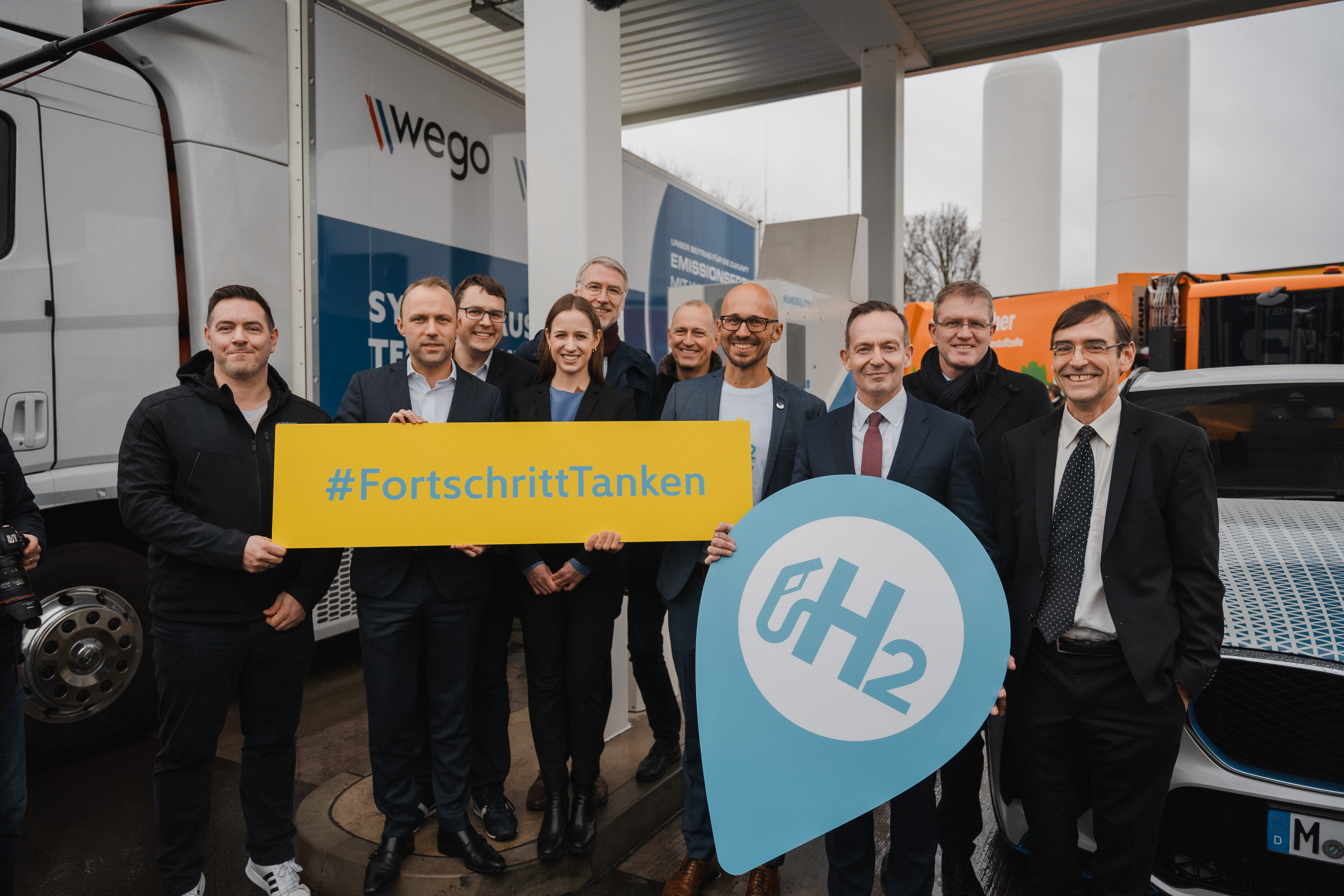 Contact details
Sybille Riepe, H2 MOBILITY Deutschland, riepe@h2-mobility.de, 0170 587 03 17
For more information, please visit www.h2-mobility and https://h2.live/
Contact details
Sybille Riepe, H2 MOBILITY Deutschland, riepe@h2-mobility.de, 0170 587 03 17
For more information, please visit www.h2-mobility and https://h2.live/ 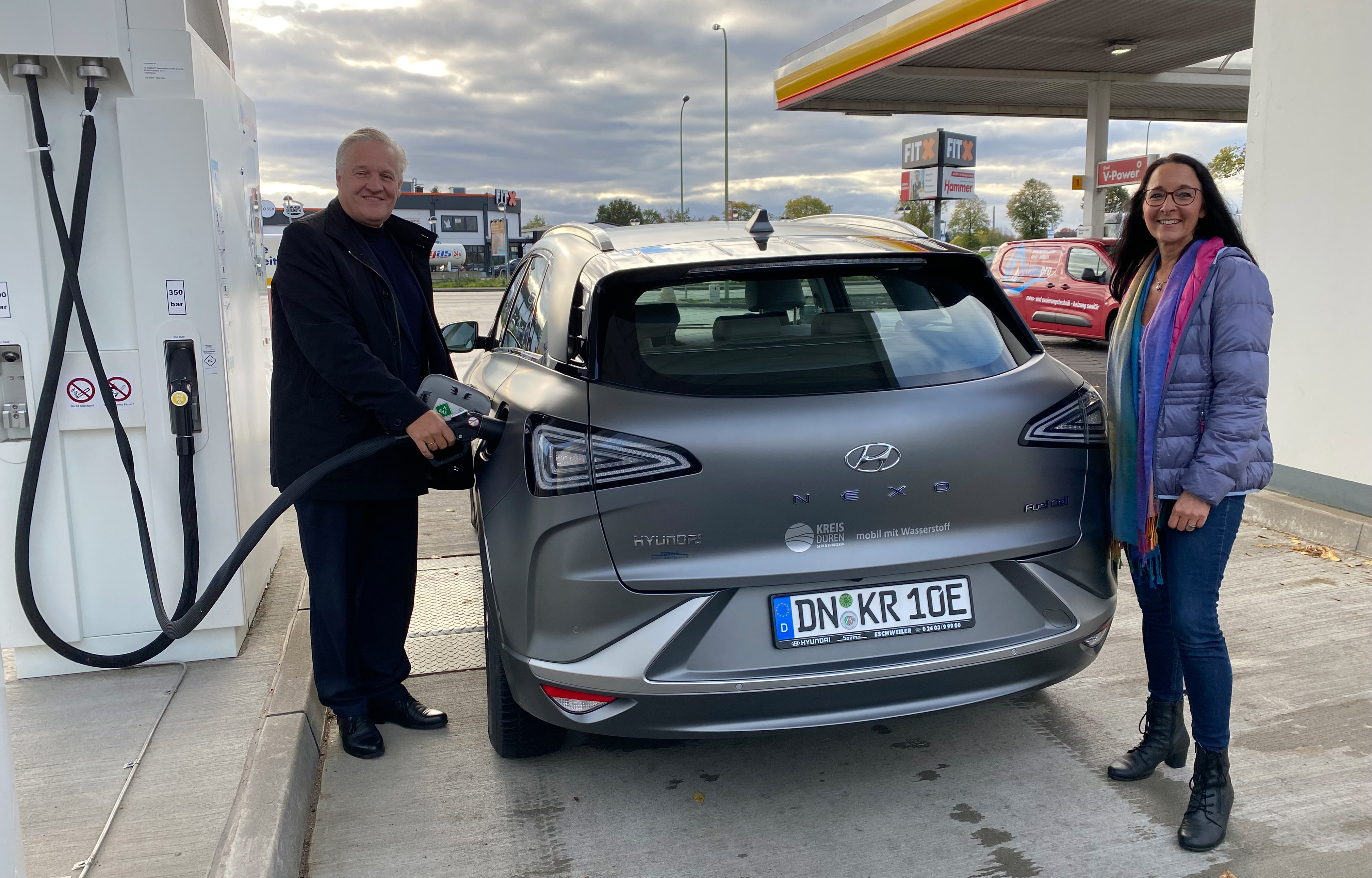 H2 MOBILITY News, District of Düren, 4 Nov. 2022 | Partners H2 MOBILITY Deutschland, Shell and Air Liquide today launched the operations optimisation phase at the Shell filling station at Im Großen Tal 1. Fuel cell buses and cars can now refuel with hydrogen (H2) in Düren as well.
The H2 filling station is now regularly available for refuelling hydrogen buses and trucks at 350 bar and passenger cars at 700 bar. Part of the commissioning process, operations optimisation is a standard procedure during which final work is still being carried out in the background.
“I am very pleased that it is now also possible to refuel with hydrogen in the Düren district. This is another important building block in our hydrogen strategy. The filling station is enormously important to further advance the innovation topic of hydrogen,” said District Administrator Wolfgang Spelthahn.
“Rurtalbus GmbH is pleased to be able to use the state-of-the-art hydrogen filling station in such a convenient location for the hydrogen fleet with immediate effect. This hydrogen filling station represents an important infrastructure facility for the steadily growing hydrogen bus fleet for the next few years and is an essential building block for the stepwise conversion of the bus fleet to hydrogen,” added Nik Asbach, Managing Director of Rurtalbus.
Hydrogen is used to power FCEVs (fuel cell electric vehicles). Their advantages: no noise and no pollutants, but the same use, speed, and range as vehicles with petrol or diesel engines. Hydrogen cars have ranges of up to 700 kilometres and refuel in just three to five minutes; buses, like conventional buses, need about 15 minutes to refuel, for a range of up to 300 kilometres.
The Düren hydrogen station is conveniently located on the A4 motorway and closes the supply gap between Cologne and Aachen. The station complements the 19 hydrogen filling stations in NRW to date.
The district of Düren already operates three H2 vehicles in its fleet, as well as five hydrogen buses. Hydrogen cars are also in use in neighbouring municipalities. Once the Brainergy Park in Jülich is completed, the filling station can be supplied with green, regeneratively produced hydrogen.
Europe’s leading operator of hydrogen filling stations, H2 MOBILITY Deutschland, is responsible for the hydrogen filling station’s construction and operation. The filling station technology at the new H2 filling station is supplied by the industrial gases and technology company Air Liquide. More than 500 kilograms of hydrogen are stored at the station, and vehicles can be refuelled at two pressure levels, 700 and 350 bar.
The Federal Ministry of Digital Affairs and Transport funded the construction of the hydrogen filling station with a total of EUR 1.37 million under its National Hydrogen and Fuel Cell Technology Innovation Programme. The funding directive is coordinated by NOW GmbH and implemented by the Jülich Project Management (PtJ).
The hydrogen filling station network in Germany
Fuel-cell vehicle drivers can currently refuel cars, smaller commercial vehicles, and utility vehicles such as waste collectors at 700 bar at nearly 100 public hydrogen filling stations in Germany. 350-bar refuelling for buses and trucks is also possible at some of these stations.
H2 MOBILITY continues to expand the hydrogen filling station infrastructure in focus regions and along the TEN-T corridors in line with demand. In addition, existing 700-bar hydrogen filling stations will be expanded short-term to include 350-bar pumps.
Contact details:
Sybille Riepe, H2 MOBILITY Deutschland, riepe@h2-mobility.de, 0170 587 03 17
For more information, please visit www.h2-mobility and https://h2.live/
Caption (left to right): District Administrator Wolfgang Spelthahn, Anne Schüssler
H2 MOBILITY News, District of Düren, 4 Nov. 2022 | Partners H2 MOBILITY Deutschland, Shell and Air Liquide today launched the operations optimisation phase at the Shell filling station at Im Großen Tal 1. Fuel cell buses and cars can now refuel with hydrogen (H2) in Düren as well.
The H2 filling station is now regularly available for refuelling hydrogen buses and trucks at 350 bar and passenger cars at 700 bar. Part of the commissioning process, operations optimisation is a standard procedure during which final work is still being carried out in the background.
“I am very pleased that it is now also possible to refuel with hydrogen in the Düren district. This is another important building block in our hydrogen strategy. The filling station is enormously important to further advance the innovation topic of hydrogen,” said District Administrator Wolfgang Spelthahn.
“Rurtalbus GmbH is pleased to be able to use the state-of-the-art hydrogen filling station in such a convenient location for the hydrogen fleet with immediate effect. This hydrogen filling station represents an important infrastructure facility for the steadily growing hydrogen bus fleet for the next few years and is an essential building block for the stepwise conversion of the bus fleet to hydrogen,” added Nik Asbach, Managing Director of Rurtalbus.
Hydrogen is used to power FCEVs (fuel cell electric vehicles). Their advantages: no noise and no pollutants, but the same use, speed, and range as vehicles with petrol or diesel engines. Hydrogen cars have ranges of up to 700 kilometres and refuel in just three to five minutes; buses, like conventional buses, need about 15 minutes to refuel, for a range of up to 300 kilometres.
The Düren hydrogen station is conveniently located on the A4 motorway and closes the supply gap between Cologne and Aachen. The station complements the 19 hydrogen filling stations in NRW to date.
The district of Düren already operates three H2 vehicles in its fleet, as well as five hydrogen buses. Hydrogen cars are also in use in neighbouring municipalities. Once the Brainergy Park in Jülich is completed, the filling station can be supplied with green, regeneratively produced hydrogen.
Europe’s leading operator of hydrogen filling stations, H2 MOBILITY Deutschland, is responsible for the hydrogen filling station’s construction and operation. The filling station technology at the new H2 filling station is supplied by the industrial gases and technology company Air Liquide. More than 500 kilograms of hydrogen are stored at the station, and vehicles can be refuelled at two pressure levels, 700 and 350 bar.
The Federal Ministry of Digital Affairs and Transport funded the construction of the hydrogen filling station with a total of EUR 1.37 million under its National Hydrogen and Fuel Cell Technology Innovation Programme. The funding directive is coordinated by NOW GmbH and implemented by the Jülich Project Management (PtJ).
The hydrogen filling station network in Germany
Fuel-cell vehicle drivers can currently refuel cars, smaller commercial vehicles, and utility vehicles such as waste collectors at 700 bar at nearly 100 public hydrogen filling stations in Germany. 350-bar refuelling for buses and trucks is also possible at some of these stations.
H2 MOBILITY continues to expand the hydrogen filling station infrastructure in focus regions and along the TEN-T corridors in line with demand. In addition, existing 700-bar hydrogen filling stations will be expanded short-term to include 350-bar pumps.
Contact details:
Sybille Riepe, H2 MOBILITY Deutschland, riepe@h2-mobility.de, 0170 587 03 17
For more information, please visit www.h2-mobility and https://h2.live/
Caption (left to right): District Administrator Wolfgang Spelthahn, Anne Schüssler
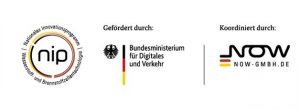
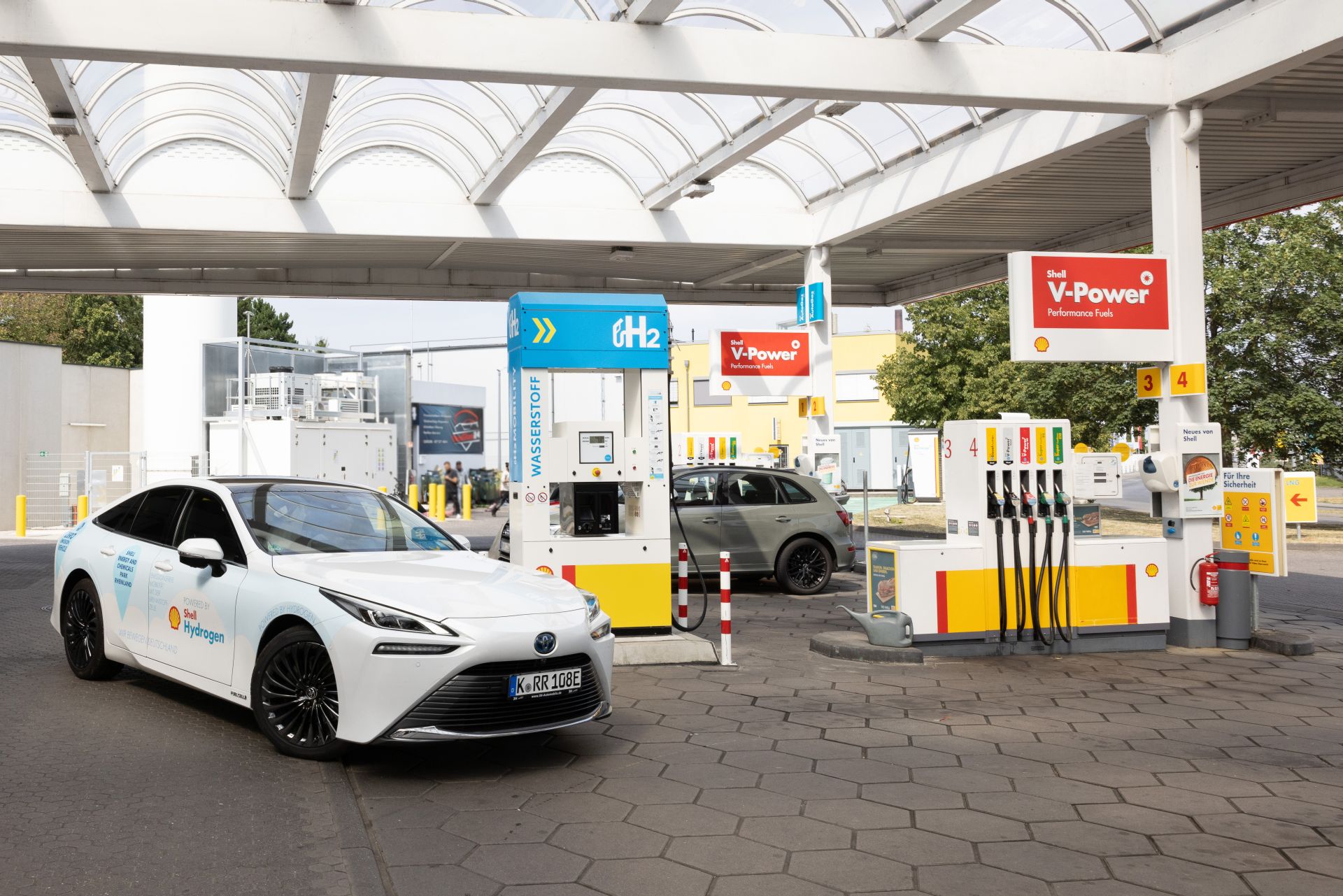 Wesseling, 18 August 2022 | Today, partners Shell and H2 MOBILITY Germany
commissioned the filling station at the Wesseling Shell station at Ahrstrasse
99. Drivers of zero-emission fuel-cell passenger cars now have another
refuelling option in the Cologne area.
The station is conveniently located on the A555 in the Wesseling industrial zone on the
direct route from Cologne-Bonn. It complements the focus region, where hydrogen (H2)
refuelling options already exist in Cologne-Frechen and at the Cologne-Bonn Airport.
The company responsible for building and operating the hydrogen filling station is H2
MOBILITY Deutschland, a key player in driving forward the expansion of the hydrogen
infrastructure in Germany. The filling station technology at the new H2 filling station
comes from the technology and gas company Linde and is state of the art.
Hydrogen offers the possibility of expanding the fuel supply in the transport sector in a
climate-friendly way, because hydrogen – especially if it is produced using renewable
sources – can help to significantly reduce climate-damaging CO2 emissions. Operating a
hydrogen-powered fuel-cell vehicle causes neither local pollutants nor carbon dioxide
emissions. The advantage of hydrogen fuel-cell vehicles: short refuelling times for long
ranges.
The additional station reaffirms Shell’s commitment to the hydrogen business. The
company intends to become a leading provider of green H2 for industrial and transport
customers. Among other things, Shell operates a 10 MW PEM electrolysis for the
production of green hydrogen plant at the Shell Energy and Chemicals Park Rheinland in
the immediate vicinity of the filling station.
For the construction of the hydrogen station in Wesseling, H2 MOBILITY Germany received
funding of at least €950,000 under the National Hydrogen and Fuel Cell Technology
Innovation Programme (NIP) of Germany’s Federal Ministry of Digital and Transport
(BMDV).
H2 MOBILITY Germany
H2 MOBILITY Germany is creating the conditions for unlimited clean, quiet, and
uncomplicated hydrogen mobility in the European GSA nations: The company is in
charge of building and operating a network of public hydrogen filling stations that
enables electric mobility for light- to medium-duty commercial H2 vehicles (e.g. vans,
buses, trucks, waste collection vehicles), as well as H2 passenger cars, without range
restrictions and with short refuelling times. With the market ramp-up of the first
commercial fuel-cell vehicles, existing hydrogen filling stations are quickly being
expanded and new, larger filling stations being built where demand is expected to
increase. Through H2 MOBILITY SERVICES, H2 MOBILITY Deutschland also
supports third parties in planning, building, and operating H2 filling stations. H2
MOBILITY Germany is the initiator of the WOCHE DES WASSERSTOFFS
(HYDROGEN WEEK) events.
Its shareholders are Air Liquide, Daimler Truck, Hy24, Hyundai, Linde, OMV, Shell and
TotalEnergies. BMW, Honda, Tank&Rast Group, Toyota and Volkswagen as well as NOW GmbH
Nationale Organisation Wasserstoff- und Brennstoffzellentechnologie advise H2
MOBILITY as associated partners.
Further information is available at www.h2-mobility.de and h2.live
PDF_PI_H2 Wesseling
PRESS ENQUIRIES:
Shell Germany Oil GmbH
Petr Sindler, +420 737 272740, petr. sindler@shell.com
Linden AG
Thomas Kurt Schaefer, +49 89 74462464, thomas.kurt.schaefer@linde.com
H2 MOBILITY Germany GmbH & Co KG
Sybille Riepe, +49 170 5870317, riepe@h2-mobility.de
Wesseling, 18 August 2022 | Today, partners Shell and H2 MOBILITY Germany
commissioned the filling station at the Wesseling Shell station at Ahrstrasse
99. Drivers of zero-emission fuel-cell passenger cars now have another
refuelling option in the Cologne area.
The station is conveniently located on the A555 in the Wesseling industrial zone on the
direct route from Cologne-Bonn. It complements the focus region, where hydrogen (H2)
refuelling options already exist in Cologne-Frechen and at the Cologne-Bonn Airport.
The company responsible for building and operating the hydrogen filling station is H2
MOBILITY Deutschland, a key player in driving forward the expansion of the hydrogen
infrastructure in Germany. The filling station technology at the new H2 filling station
comes from the technology and gas company Linde and is state of the art.
Hydrogen offers the possibility of expanding the fuel supply in the transport sector in a
climate-friendly way, because hydrogen – especially if it is produced using renewable
sources – can help to significantly reduce climate-damaging CO2 emissions. Operating a
hydrogen-powered fuel-cell vehicle causes neither local pollutants nor carbon dioxide
emissions. The advantage of hydrogen fuel-cell vehicles: short refuelling times for long
ranges.
The additional station reaffirms Shell’s commitment to the hydrogen business. The
company intends to become a leading provider of green H2 for industrial and transport
customers. Among other things, Shell operates a 10 MW PEM electrolysis for the
production of green hydrogen plant at the Shell Energy and Chemicals Park Rheinland in
the immediate vicinity of the filling station.
For the construction of the hydrogen station in Wesseling, H2 MOBILITY Germany received
funding of at least €950,000 under the National Hydrogen and Fuel Cell Technology
Innovation Programme (NIP) of Germany’s Federal Ministry of Digital and Transport
(BMDV).
H2 MOBILITY Germany
H2 MOBILITY Germany is creating the conditions for unlimited clean, quiet, and
uncomplicated hydrogen mobility in the European GSA nations: The company is in
charge of building and operating a network of public hydrogen filling stations that
enables electric mobility for light- to medium-duty commercial H2 vehicles (e.g. vans,
buses, trucks, waste collection vehicles), as well as H2 passenger cars, without range
restrictions and with short refuelling times. With the market ramp-up of the first
commercial fuel-cell vehicles, existing hydrogen filling stations are quickly being
expanded and new, larger filling stations being built where demand is expected to
increase. Through H2 MOBILITY SERVICES, H2 MOBILITY Deutschland also
supports third parties in planning, building, and operating H2 filling stations. H2
MOBILITY Germany is the initiator of the WOCHE DES WASSERSTOFFS
(HYDROGEN WEEK) events.
Its shareholders are Air Liquide, Daimler Truck, Hy24, Hyundai, Linde, OMV, Shell and
TotalEnergies. BMW, Honda, Tank&Rast Group, Toyota and Volkswagen as well as NOW GmbH
Nationale Organisation Wasserstoff- und Brennstoffzellentechnologie advise H2
MOBILITY as associated partners.
Further information is available at www.h2-mobility.de and h2.live
PDF_PI_H2 Wesseling
PRESS ENQUIRIES:
Shell Germany Oil GmbH
Petr Sindler, +420 737 272740, petr. sindler@shell.com
Linden AG
Thomas Kurt Schaefer, +49 89 74462464, thomas.kurt.schaefer@linde.com
H2 MOBILITY Germany GmbH & Co KG
Sybille Riepe, +49 170 5870317, riepe@h2-mobility.de

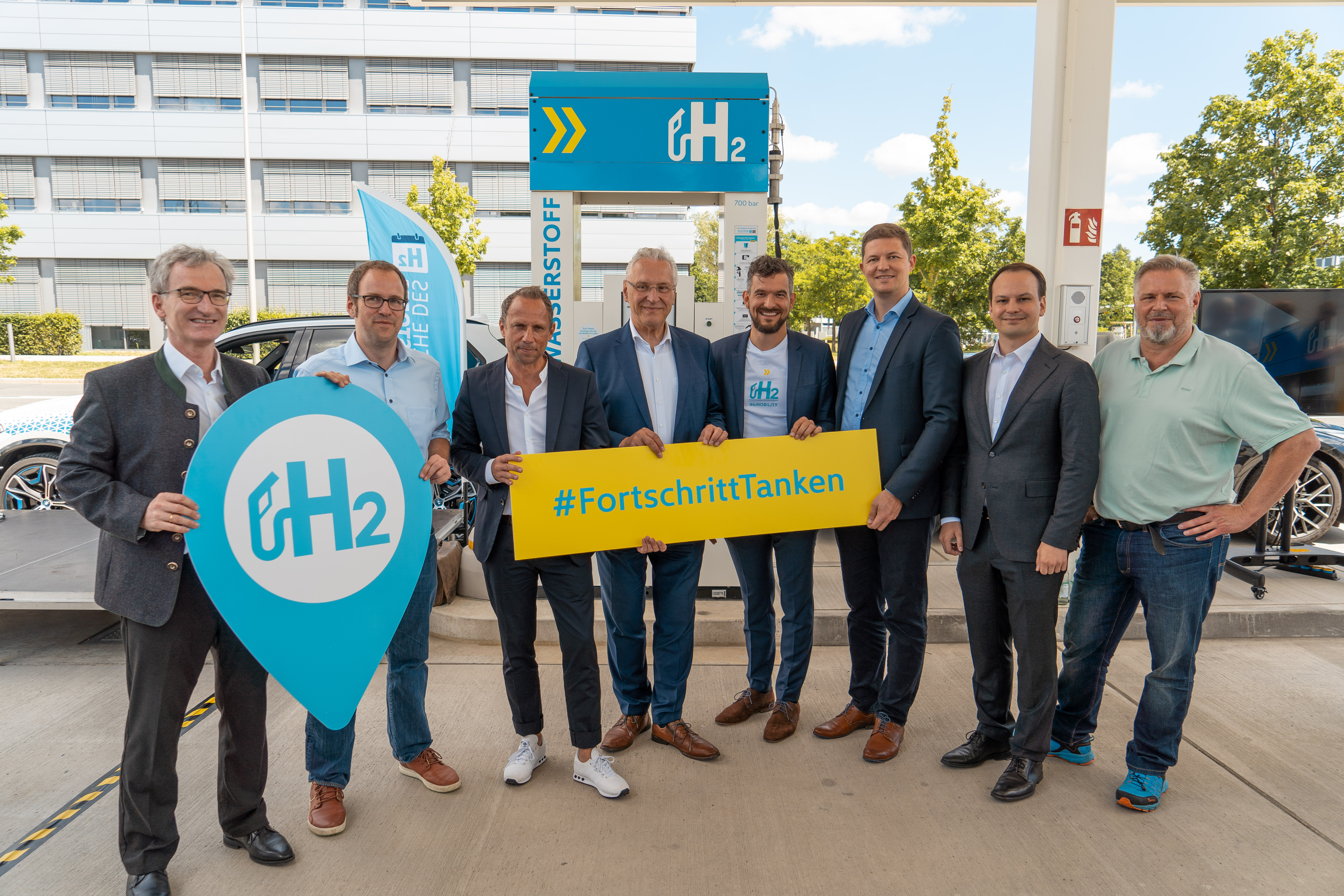 Erlangen 2 July 2022 | Drivers of fuel-cell vehicles can now refuel in Erlangen. H2 MOBILITY Deutschland, together with its shareholder Linde and partners Hydrogenious LOHC Technologies and SiemensEnergy, has launched ‘optimisation-mode’ operations at a filling station in Erlangen. Besides offering two pressure levels, the station uses electrolytically produced hydrogen (H2) and innovative Liquid Organic Hydrogen Carrier (LOHC) technology. The opening will take place as part of the WOCHE DES WASSERSTOFFS SÜD (HYDROGEN WEEK SOUTH).
The hydrogen filling station at Henri-Dunant-Strasse 2 on the Siemens AG campus benefits from the region’s many activities related to hydrogen production and storage. For instance, Hydrogenious LOHC Technologies supplies the filling station with green hydrogen, bound in liquid organic carrier material (LOHC), which is stored at the station in conventional underground tanks. The Hydrogenious release system installed at the station handles the recovery and feeding-in of the LOHC-bound hydrogen.
The station allows for 700-bar refuelling of cars and light commercial vehicles, as well as 350-bar refuelling for vehicles like buses. Erlangen was selected as a location in H2 MOBILITY Deutschland’s second funding round, the decisive factor being the city’s commitment to operating various hydrogen vehicles, including waste-collection vehicles and buses.
Minister of Economic Affairs and Energy Hubert Aiwanger: “The success of Bavarian energy research is coming to fruition today with the opening of the world’s first hydrogen filling station to use the LOHC technology we are funding, and is setting standards for the upcoming market ramp-up. Thanks to LOHC technology, hydrogen can now be easily stored on site on a significant scale and also reused. With this, we have achieved a breakthrough.”
Erlangen’s mayor Florian Janik said: “Hydrogen is a very promising future technology. In areas where traffic cannot be avoided, it can help to noticeably reduce CO2 emissions. We are pleased to be taking a pioneering step towards establishing the necessary infrastructure here in Erlangen with the opening of the hydrogen filling station.”
City Manager Jörg Volleth is likewise pleased about the expansion of the hydrogen infrastructure in Erlangen. “The opening of the hydrogen filling station gives us an additional opportunity to make an important contribution to climate protection by converting our municipal vehicle fleet to zero-emissions drive types as well. We are therefore planning to expand our fleet of special-purpose vehicles with two fuel-cell vehicles in the next few years, and review a more extensive switch in this area.”
The network of H2 filling stations continues to grow. As of today, there are 95 H2 stations in Germany, 21of them in Bavaria. The Erlangen filling station is conveniently located close to the Fürth/Erlangen motorway junction and thus to the A73 and A3. Alongside Berg bei Hof, Nuremberg and Fürth, the Erlangen site brings the total number of hydrogen filling station locations in the region to eight.
The company responsible for building and operating the hydrogen filling station is H2 MOBILITY Deutschland, a key player in driving forward the expansion of the hydrogen infrastructure in Germany. The filling station technology comes from the industrial gas and technology company Linde. The facility holds around 400 kilograms of hydrogen and is state of the art.
Hydrogen is used to power fuel-cell electric vehicles (FCEVs). Its advantages are: no noise and no pollutants while still offering the same ease of use, speed, and range as cars with petrol or diesel engines. Fuel-cell electric cars have ranges of 500 to 700 kilometres and are refuelled in just three to five minutes. Hydrogen thus offers the possibility of expanding the fuel supply in the transport sector in a climate-friendly way, because hydrogen – especially if it is produced using renewable sources – can help to significantly reduce climate-damaging CO2 emissions.
For the construction of the hydrogen station in Erlangen, H2 MOBILITY Deutschland received funding of €984,898 under the National Hydrogen and Fuel Cell Technology Innovation Programme (NIP) of Germany’s Federal Ministry of Digital and Transport (BMDV).
Erlangen 2 July 2022 | Drivers of fuel-cell vehicles can now refuel in Erlangen. H2 MOBILITY Deutschland, together with its shareholder Linde and partners Hydrogenious LOHC Technologies and SiemensEnergy, has launched ‘optimisation-mode’ operations at a filling station in Erlangen. Besides offering two pressure levels, the station uses electrolytically produced hydrogen (H2) and innovative Liquid Organic Hydrogen Carrier (LOHC) technology. The opening will take place as part of the WOCHE DES WASSERSTOFFS SÜD (HYDROGEN WEEK SOUTH).
The hydrogen filling station at Henri-Dunant-Strasse 2 on the Siemens AG campus benefits from the region’s many activities related to hydrogen production and storage. For instance, Hydrogenious LOHC Technologies supplies the filling station with green hydrogen, bound in liquid organic carrier material (LOHC), which is stored at the station in conventional underground tanks. The Hydrogenious release system installed at the station handles the recovery and feeding-in of the LOHC-bound hydrogen.
The station allows for 700-bar refuelling of cars and light commercial vehicles, as well as 350-bar refuelling for vehicles like buses. Erlangen was selected as a location in H2 MOBILITY Deutschland’s second funding round, the decisive factor being the city’s commitment to operating various hydrogen vehicles, including waste-collection vehicles and buses.
Minister of Economic Affairs and Energy Hubert Aiwanger: “The success of Bavarian energy research is coming to fruition today with the opening of the world’s first hydrogen filling station to use the LOHC technology we are funding, and is setting standards for the upcoming market ramp-up. Thanks to LOHC technology, hydrogen can now be easily stored on site on a significant scale and also reused. With this, we have achieved a breakthrough.”
Erlangen’s mayor Florian Janik said: “Hydrogen is a very promising future technology. In areas where traffic cannot be avoided, it can help to noticeably reduce CO2 emissions. We are pleased to be taking a pioneering step towards establishing the necessary infrastructure here in Erlangen with the opening of the hydrogen filling station.”
City Manager Jörg Volleth is likewise pleased about the expansion of the hydrogen infrastructure in Erlangen. “The opening of the hydrogen filling station gives us an additional opportunity to make an important contribution to climate protection by converting our municipal vehicle fleet to zero-emissions drive types as well. We are therefore planning to expand our fleet of special-purpose vehicles with two fuel-cell vehicles in the next few years, and review a more extensive switch in this area.”
The network of H2 filling stations continues to grow. As of today, there are 95 H2 stations in Germany, 21of them in Bavaria. The Erlangen filling station is conveniently located close to the Fürth/Erlangen motorway junction and thus to the A73 and A3. Alongside Berg bei Hof, Nuremberg and Fürth, the Erlangen site brings the total number of hydrogen filling station locations in the region to eight.
The company responsible for building and operating the hydrogen filling station is H2 MOBILITY Deutschland, a key player in driving forward the expansion of the hydrogen infrastructure in Germany. The filling station technology comes from the industrial gas and technology company Linde. The facility holds around 400 kilograms of hydrogen and is state of the art.
Hydrogen is used to power fuel-cell electric vehicles (FCEVs). Its advantages are: no noise and no pollutants while still offering the same ease of use, speed, and range as cars with petrol or diesel engines. Fuel-cell electric cars have ranges of 500 to 700 kilometres and are refuelled in just three to five minutes. Hydrogen thus offers the possibility of expanding the fuel supply in the transport sector in a climate-friendly way, because hydrogen – especially if it is produced using renewable sources – can help to significantly reduce climate-damaging CO2 emissions.
For the construction of the hydrogen station in Erlangen, H2 MOBILITY Deutschland received funding of €984,898 under the National Hydrogen and Fuel Cell Technology Innovation Programme (NIP) of Germany’s Federal Ministry of Digital and Transport (BMDV).
#WDWS 2022 (www.woche-des-wasserstoffs.de.)
The WOCHE DES WASSERSTOFFS (HYDROGEN WEEK) will take place for the fourth time in 2022 – from June 25th to July 3rd – with over 110 events related to the energy carrier hydrogen as WOCHE DES WASSERSTOFFS SÜD (HYDROGEN WEEK SOUTH) (#WDWS2022) in the states of Bavaria, Baden-Württemberg, Hesse, Rhineland -Palatinate and in Saarland. The WDWS has set itself the goal of conveying the subject of hydrogen in a credible and clear manner: over nine days, companies, universities, networks, initiatives, districts and cities invite you to information events. The events are organized by the participants themselves. H2 MOBILITY Deutschland is the initiator of the WDW. The WDWS will be accompanied by film. The main motif is the “hydrogen sofa.
H2 MOBILITY Deutschland H2 MOBILITY Deutschland is creating the conditions for unlimited clean, quiet, and uncomplicated hydrogen mobility in the European GSA nations. The company is in charge of building and operating a network of public hydrogen filling stations that enables electric mobility for light- to medium-duty commercial H2 vehicles (e.g. vans, buses, trucks, waste collection vehicles), as well as H2 passenger cars, without range restrictions and with short refuelling times. With the market ramp-up of the first commercial fuel-cell vehicles, existing hydrogen filling stations are quickly being expanded and new, larger filling stations being built where demand is expected to increase. Through H2 MOBILITY SERVICES, H2 MOBILITY Deutschland also supports third parties in planning, building, and operating H2 filling stations. H2 MOBILITY Germany is the initiator of the WOCHE DES WASSERSTOFFS (HYDROGEN WEEK) events. Its shareholders are Air Liquide, Daimler Truck, Hy24, Hyundai, Linde, OMV, Shell and TotalEnergies. BMW, Honda, Tank&Rast Group, Toyota and Volkswagen as well as NOW GmbH Nationale Organisation Wasserstoff- und Brennstoffzellentechnologie advise H2 MOBILITY as associated partners. Further information is available at www.h2-mobility.de and h2.live Press images on July 2Erlangen, 2 July 2022 from approx. 14:00 here. From left to right: Markus Bachmeier, Linde; Dr Florian Janik, Mayor of Erlangen; Thorsten Glauber, Bavarian State Minister for the Environment and Consumer Protection, Joachim Herrmann, Bavarian State Minister of the Interior, for Sport and Integration; Lorenz Jung, H2 MOBILITY Germany; Daniel Teichmann, Hydrogenious LOHC Technologies; Matthias Fischbach, MdL; Gerald Giering, SiemensEnergy Moor pictures here. PRESS ENQUIRIES: H2 MOBILITY Germany GmbH & Co KG Sybille Riepe, +49 170 5870317, riepe@h2-mobility.de Linde AG Thomas Schaefer, +49 89 7446 2464, thomas.kurt.schaefer@linde.com Hydrogenious LOHC Technologies GmbH Birka Friedrich, +49 9131 12640-0, birka.friedrich@hydrogenious.net Siemens Energy Alfons Benzinger, +49 174 155 9447, alfons.benzinger@siemens-energy.com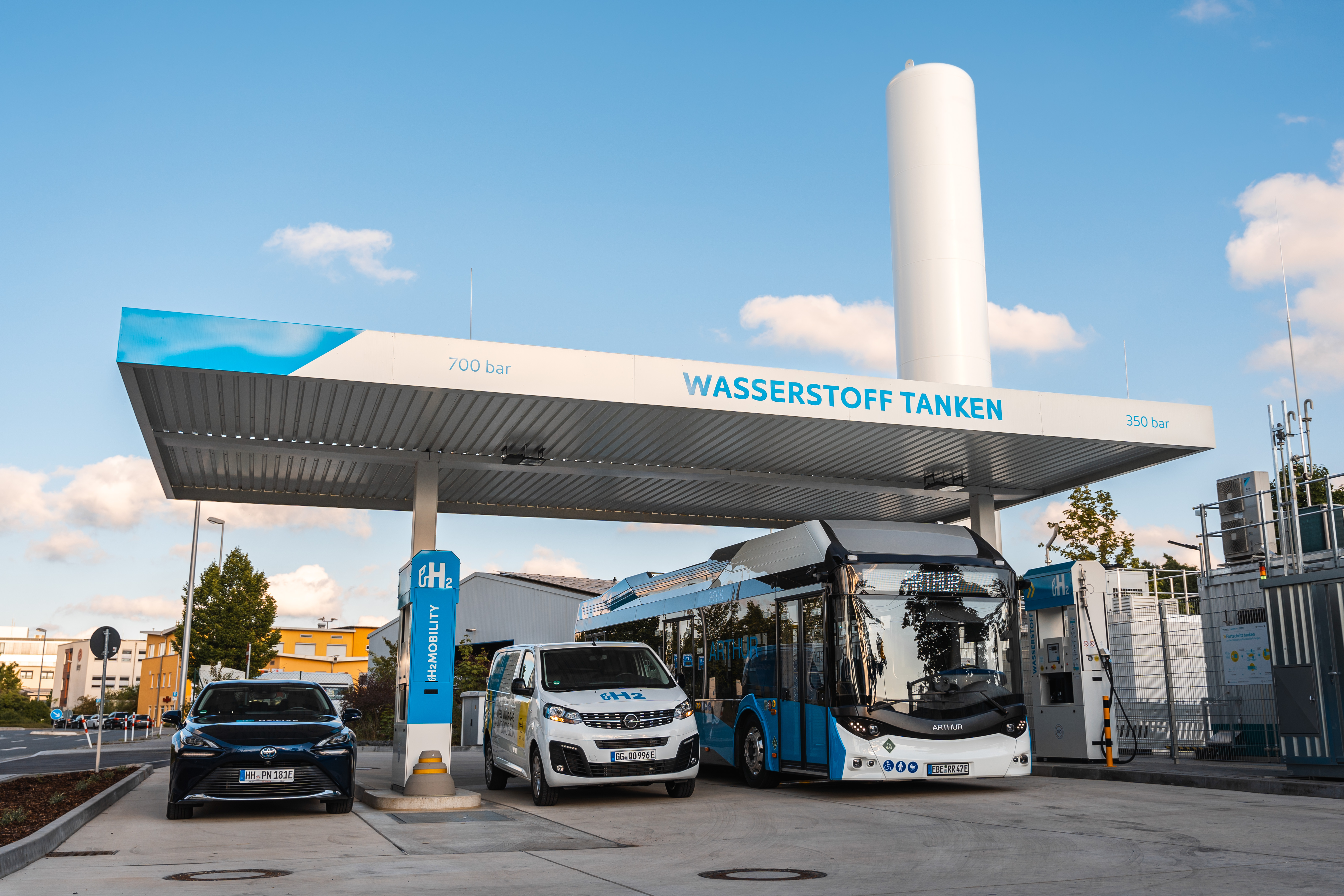 Toyota Mirai, Opel Vivaro-e HYDROGEN, ARTHUR Bus, Copy H2 MOBILITY
Toyota Mirai, Opel Vivaro-e HYDROGEN, ARTHUR Bus, Copy H2 MOBILITY

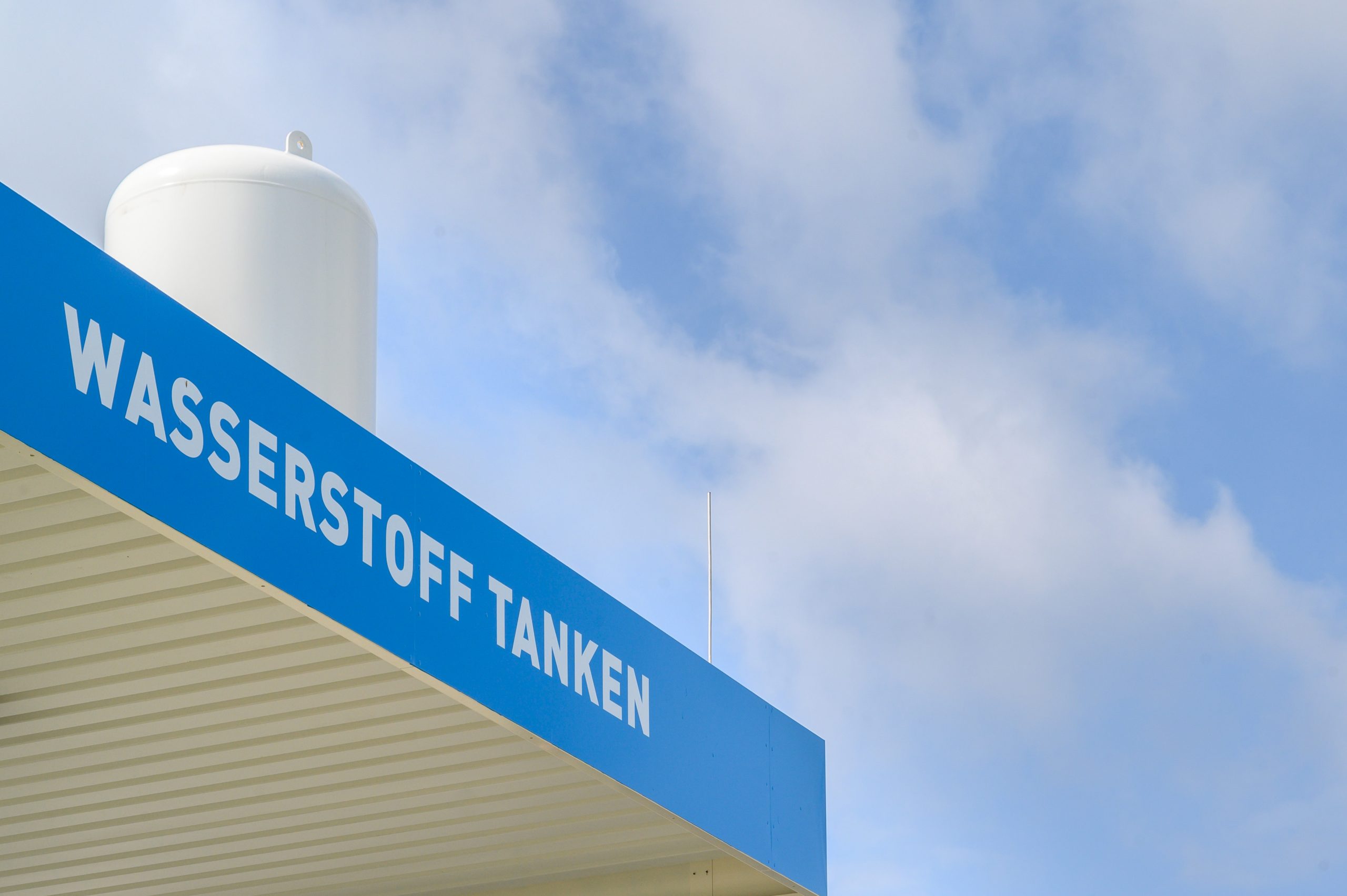 Freiburg, 14 Jun 2022 | Drivers of fuel-cell passenger cars can now refuel with hydrogen in the city of Freiburg. Partners TotalEnergies, Air Liquide, and H2 MOBILITY Germany commissioned the filling station at the TotalEnergies station, Gundelfinger Str. 27, in 79108 Freiburg on 2 June 2022. The filling station closes a gap in the hydrogen network between Baden-Baden and Basel.
The H2 filling station is now available, in optimisation mode, for regular refuelling of hydrogen vehicles at 700 bar. Optimisation mode is a standard commissioning procedure during which final work is carried out in the background.
Hydrogen is used to power fuel-cell electric vehicles (FCEVs). Its advantages are no noise and no pollutants while still offering the same ease of use, speed, and range as cars with petrol or diesel engines. Fuel-cell electric cars have ranges of 500 to 700 kilometres and are refuelled in just three to five minutes. Hydrogen thus offers the possibility of expanding the fuel supply in the transport sector in a climate-friendly way, because hydrogen – especially if it is produced using renewable sources – can help to significantly reduce climate-damaging CO2 emissions.
The company responsible for building and operating the hydrogen filling station is H2 MOBILITY Deutschland, a key player in driving forward the expansion of the hydrogen infrastructure in Germany.
The new filling station reaffirms TotalEnergies’ commitment to the hydrogen business. The company intends to build a European H2 ecosystem and become a leading provider of green hydrogen for industrial and transport customers. By 2030, TotalEnergies plans to directly or indirectly operate as many as 150 hydrogen refuelling stations in Germany, the Netherlands, Belgium, Luxembourg and France.
The filling-station technology at the new H2 filling station comes from the industrial gas and technology company Air Liquide. The facility can also be used by, among others, Abfallwirtschaft und Stadtreinigung Freiburg GmbH, the city’s waste management and urban sanitation company, which currently has two FAUN vehicles.
For the construction of the hydrogen station in Freiburg, H2 MOBILITY Germany received funding of approximately €850,000 under the National Hydrogen and Fuel Cell Technology Innovation Programme (NIP) of Germany’s Federal Ministry of Digital and Transport (BMDV).
H2 MOBILITY Germany
H2 MOBILITY Germany is creating the conditions for unlimited clean, quiet, and uncomplicated hydrogen mobility in the European GSA nations. The company is in charge of building and operating a network of public hydrogen filling stations that enables electric mobility for light- to medium-duty commercial H2 vehicles (e.g. vans, buses, trucks, waste collection vehicles), as well as H2 passenger cars, without range restrictions and with short refuelling times. With the market ramp-up of the first commercial fuel-cell vehicles, existing hydrogen filling stations are quickly being expanded and new, larger filling stations being built where demand is expected to increase. Through H2 MOBILITY SERVICES, H2 MOBILITY Deutschland also supports third parties in planning, building, and operating H2 filling stations. H2 MOBILITY Germany is the initiator of the WOCHE DES WASSERSTOFFS (HYDROGEN WEEK) events.
Its shareholders are Air Liquide, Daimler Truck, Hy24, Hyundai, Linde, OMV, Shell and TotalEnergies.BMW, Honda, Tank&Rast Group, Toyota and Volkswagen as well as NOW GmbH Nationale Organisation Wasserstoff- und Brennstoffzellentechnologie advise H2 MOBILITY as associated partners.
Further information is available at www.h2-mobility.de and h2.live
PRESS ENQUIRIES:
TotalEnergies Germany GmbH
Nadia Hagemann, +49 162 1333 842, nadia.hagemann@totalenergies.com
Delphine Saucier, +49 30 2027 6231, delphine.saucier@totalenergies.com
H2 MOBILITY Germany GmbH & Co KG
Sybille Riepe, +49 170 5870317, riepe@h2-mobility.de
Freiburg, 14 Jun 2022 | Drivers of fuel-cell passenger cars can now refuel with hydrogen in the city of Freiburg. Partners TotalEnergies, Air Liquide, and H2 MOBILITY Germany commissioned the filling station at the TotalEnergies station, Gundelfinger Str. 27, in 79108 Freiburg on 2 June 2022. The filling station closes a gap in the hydrogen network between Baden-Baden and Basel.
The H2 filling station is now available, in optimisation mode, for regular refuelling of hydrogen vehicles at 700 bar. Optimisation mode is a standard commissioning procedure during which final work is carried out in the background.
Hydrogen is used to power fuel-cell electric vehicles (FCEVs). Its advantages are no noise and no pollutants while still offering the same ease of use, speed, and range as cars with petrol or diesel engines. Fuel-cell electric cars have ranges of 500 to 700 kilometres and are refuelled in just three to five minutes. Hydrogen thus offers the possibility of expanding the fuel supply in the transport sector in a climate-friendly way, because hydrogen – especially if it is produced using renewable sources – can help to significantly reduce climate-damaging CO2 emissions.
The company responsible for building and operating the hydrogen filling station is H2 MOBILITY Deutschland, a key player in driving forward the expansion of the hydrogen infrastructure in Germany.
The new filling station reaffirms TotalEnergies’ commitment to the hydrogen business. The company intends to build a European H2 ecosystem and become a leading provider of green hydrogen for industrial and transport customers. By 2030, TotalEnergies plans to directly or indirectly operate as many as 150 hydrogen refuelling stations in Germany, the Netherlands, Belgium, Luxembourg and France.
The filling-station technology at the new H2 filling station comes from the industrial gas and technology company Air Liquide. The facility can also be used by, among others, Abfallwirtschaft und Stadtreinigung Freiburg GmbH, the city’s waste management and urban sanitation company, which currently has two FAUN vehicles.
For the construction of the hydrogen station in Freiburg, H2 MOBILITY Germany received funding of approximately €850,000 under the National Hydrogen and Fuel Cell Technology Innovation Programme (NIP) of Germany’s Federal Ministry of Digital and Transport (BMDV).
H2 MOBILITY Germany
H2 MOBILITY Germany is creating the conditions for unlimited clean, quiet, and uncomplicated hydrogen mobility in the European GSA nations. The company is in charge of building and operating a network of public hydrogen filling stations that enables electric mobility for light- to medium-duty commercial H2 vehicles (e.g. vans, buses, trucks, waste collection vehicles), as well as H2 passenger cars, without range restrictions and with short refuelling times. With the market ramp-up of the first commercial fuel-cell vehicles, existing hydrogen filling stations are quickly being expanded and new, larger filling stations being built where demand is expected to increase. Through H2 MOBILITY SERVICES, H2 MOBILITY Deutschland also supports third parties in planning, building, and operating H2 filling stations. H2 MOBILITY Germany is the initiator of the WOCHE DES WASSERSTOFFS (HYDROGEN WEEK) events.
Its shareholders are Air Liquide, Daimler Truck, Hy24, Hyundai, Linde, OMV, Shell and TotalEnergies.BMW, Honda, Tank&Rast Group, Toyota and Volkswagen as well as NOW GmbH Nationale Organisation Wasserstoff- und Brennstoffzellentechnologie advise H2 MOBILITY as associated partners.
Further information is available at www.h2-mobility.de and h2.live
PRESS ENQUIRIES:
TotalEnergies Germany GmbH
Nadia Hagemann, +49 162 1333 842, nadia.hagemann@totalenergies.com
Delphine Saucier, +49 30 2027 6231, delphine.saucier@totalenergies.com
H2 MOBILITY Germany GmbH & Co KG
Sybille Riepe, +49 170 5870317, riepe@h2-mobility.de

Documents
Pictures
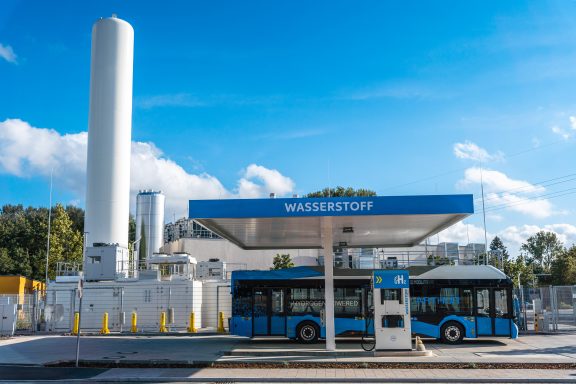
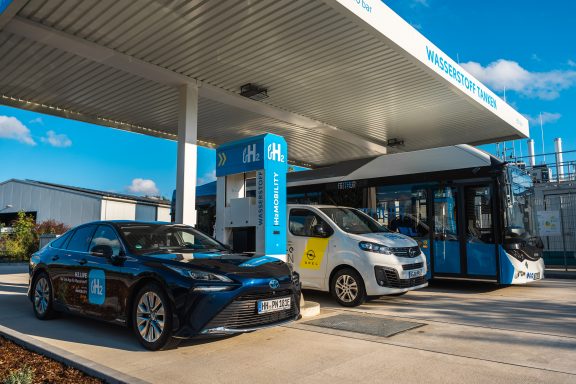
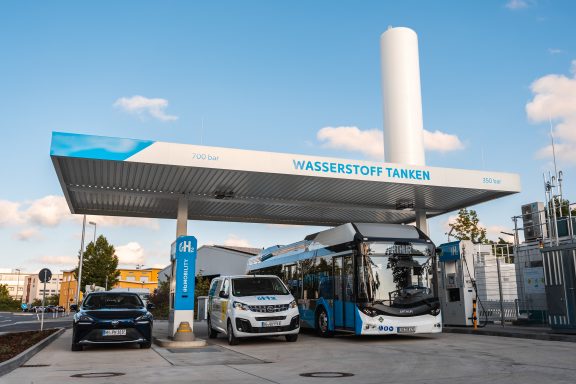
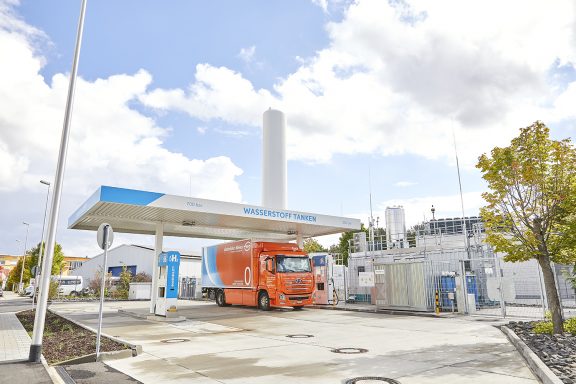 Gebrüder Weiss tanken in Erlangen, Hyundai XCient
Gebrüder Weiss tanken in Erlangen, Hyundai XCient
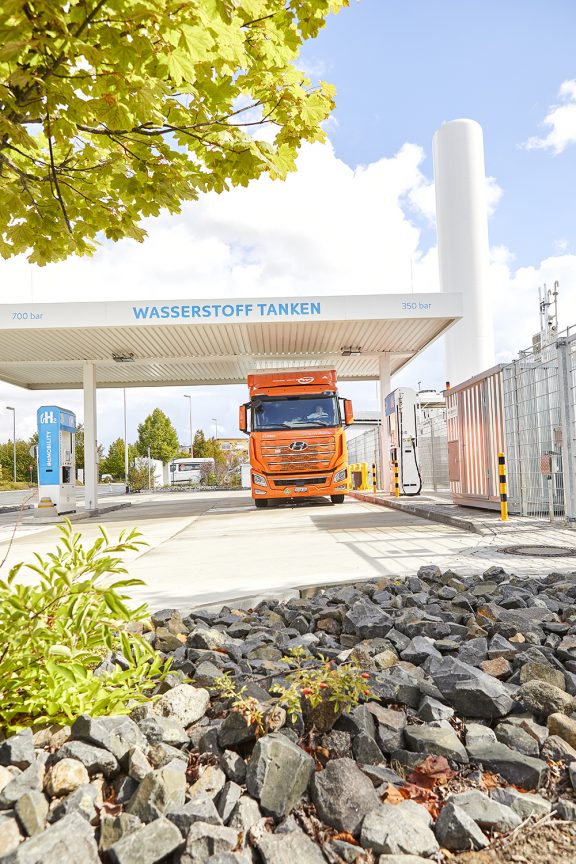 Gebrüder Weiss tanken in Erlangen, Hyundai XCient
Gebrüder Weiss tanken in Erlangen, Hyundai XCient
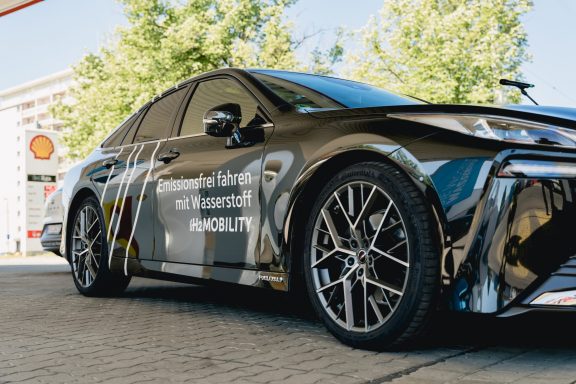 Toyota Mirai II
Toyota Mirai II
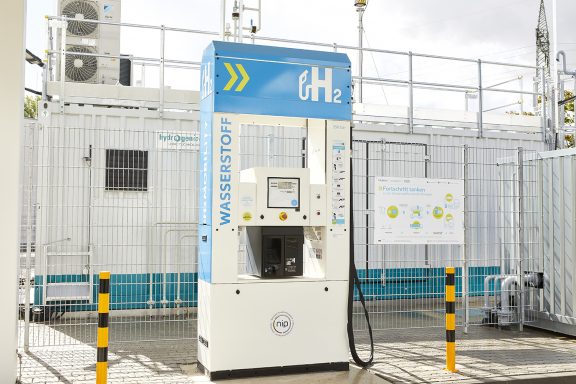 Zapfsäule in Erlangen
Zapfsäule in Erlangen
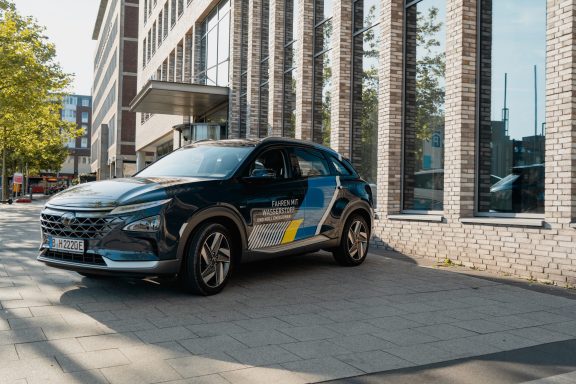 Hyundai NEXO
Hyundai NEXO
 Hyundai NEXO, Halle
Hyundai NEXO, Halle
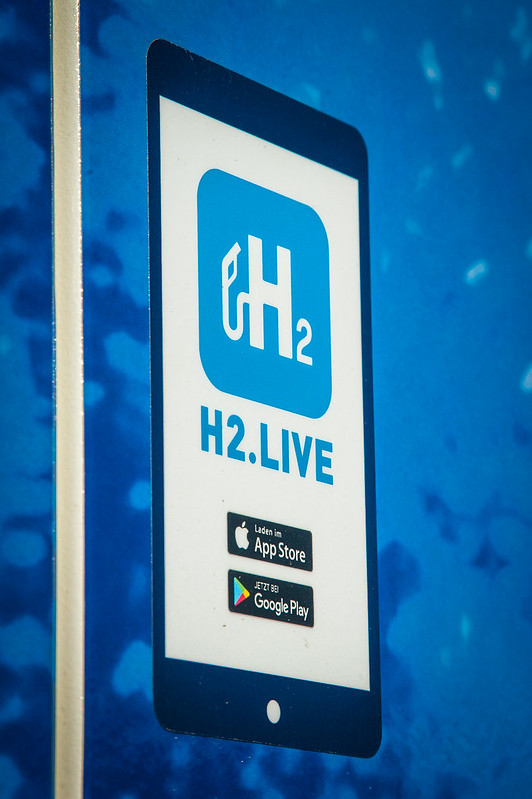 H2.LIVE
H2.LIVE
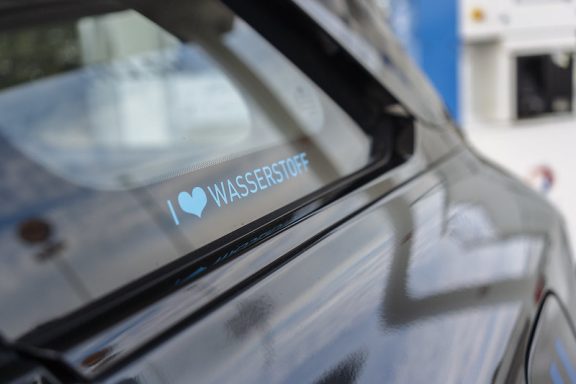 I love Wasserstoff
I love Wasserstoff
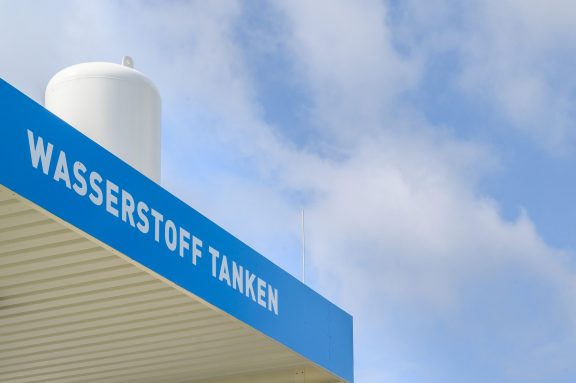 Wsserstoff tanken
Wsserstoff tanken
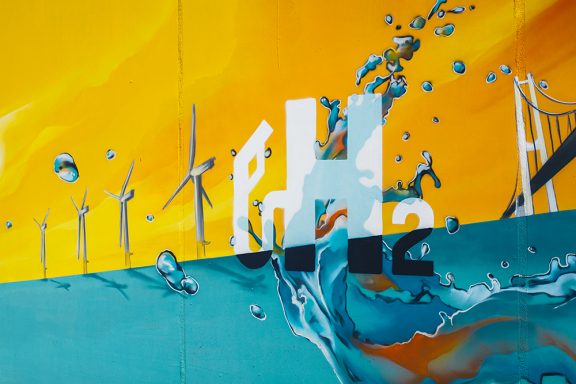 Graffiti
Graffiti
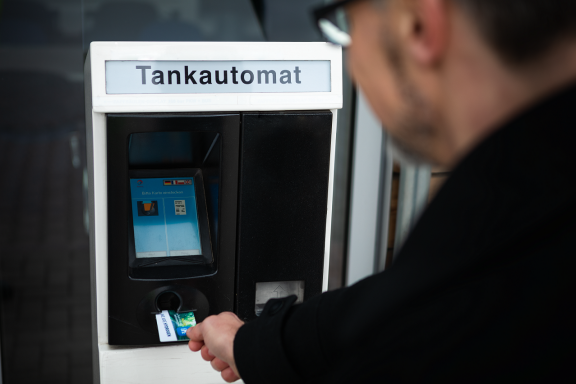 H2 MOBILITY Card
H2 MOBILITY Card
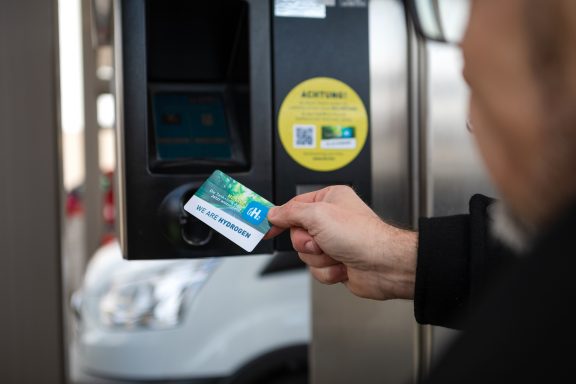 H2 MOBILITY Card
H2 MOBILITY Card
 H2.LIVE App
H2.LIVE App
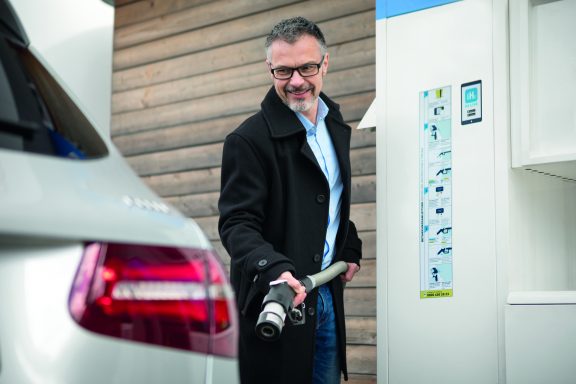 Wasserstoff tanken
Wasserstoff tanken
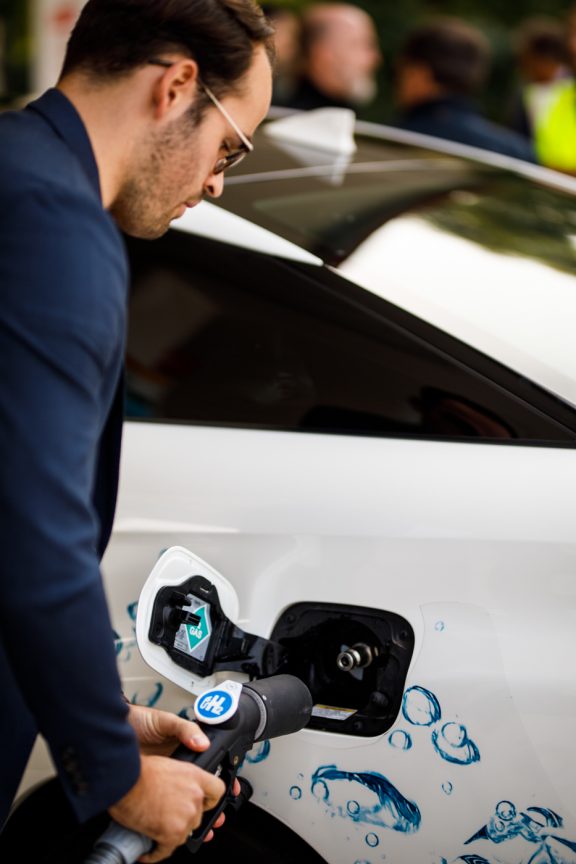 Wasserstoff tanken
Wasserstoff tanken
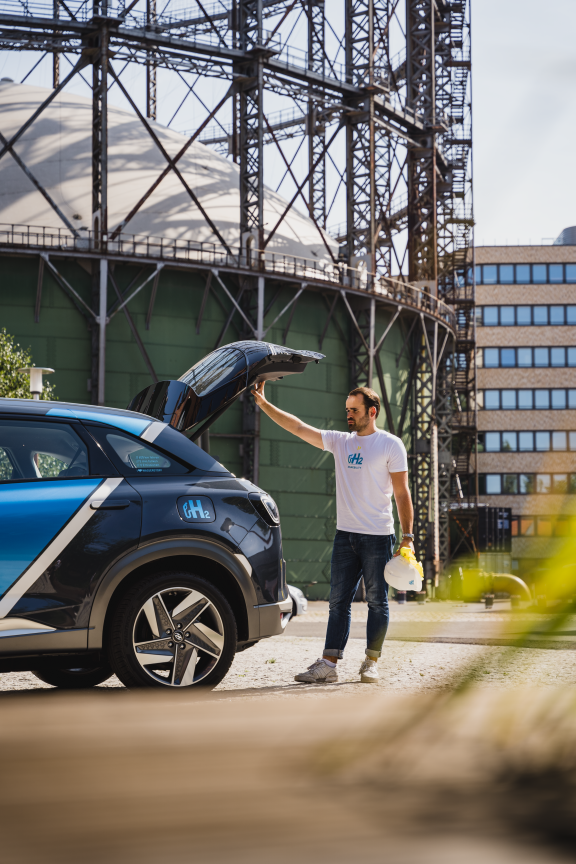 Falk Schulte-Wintrop (Strategic Business Development) am Hyundai NEXO
Falk Schulte-Wintrop (Strategic Business Development) am Hyundai NEXO
